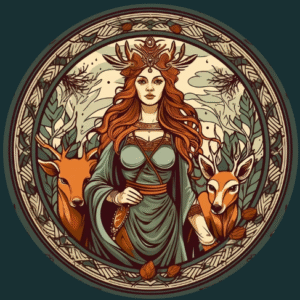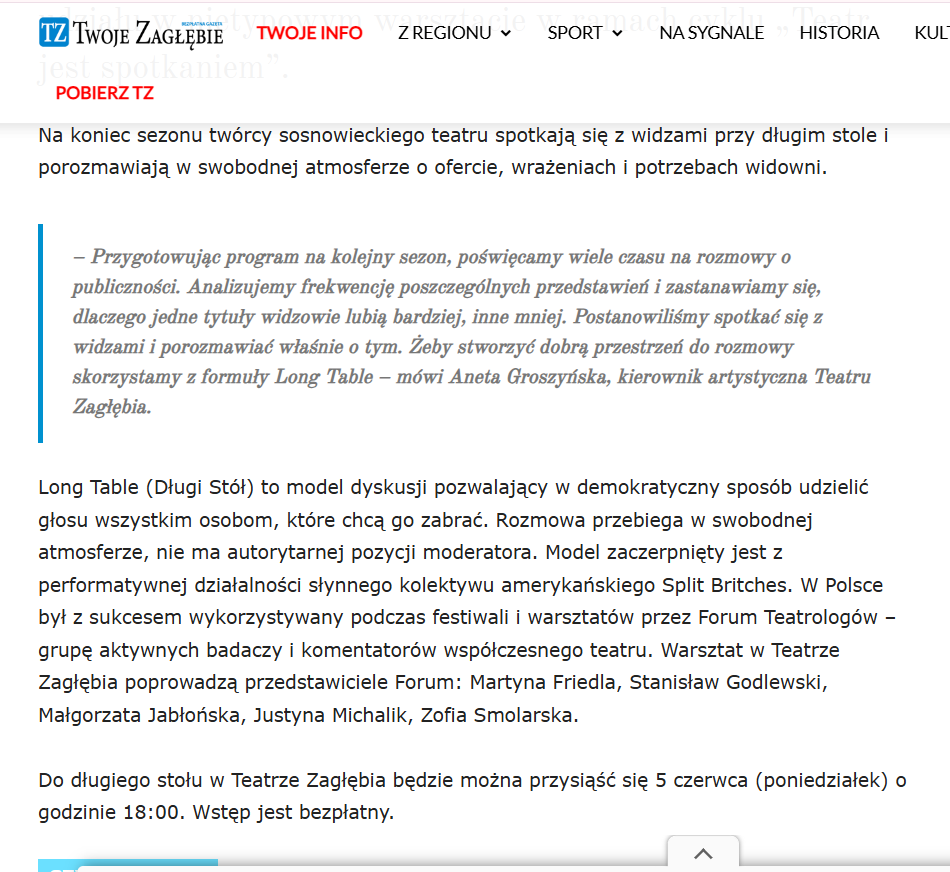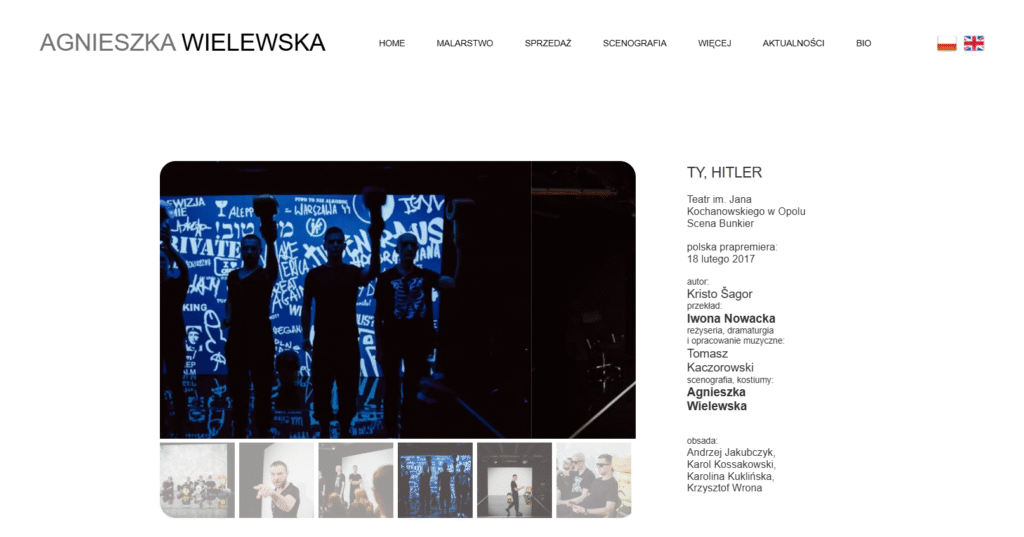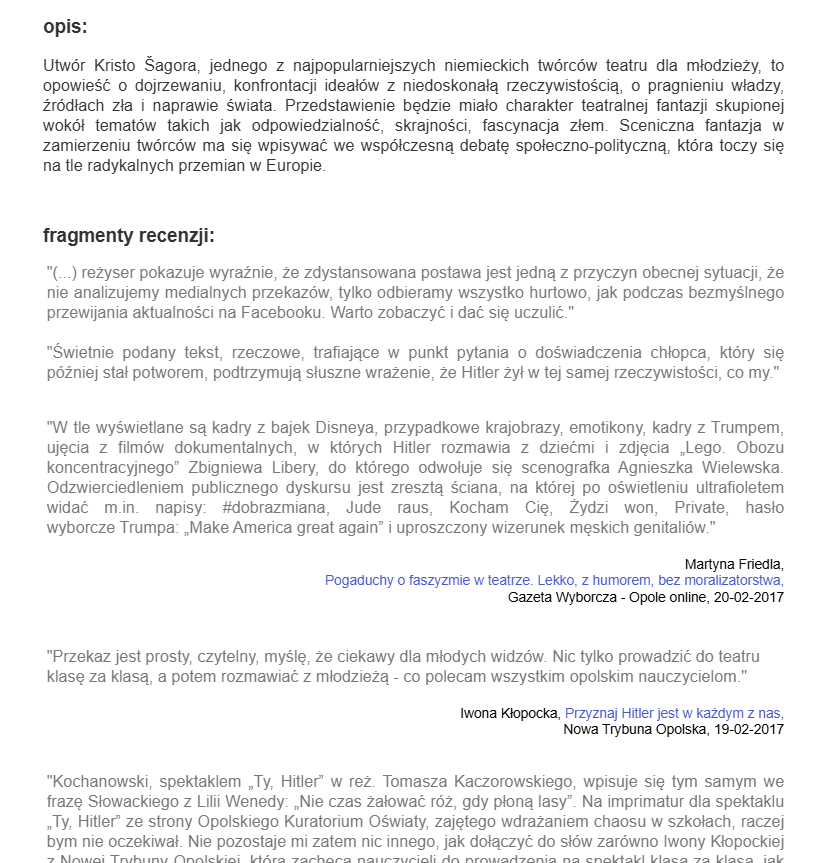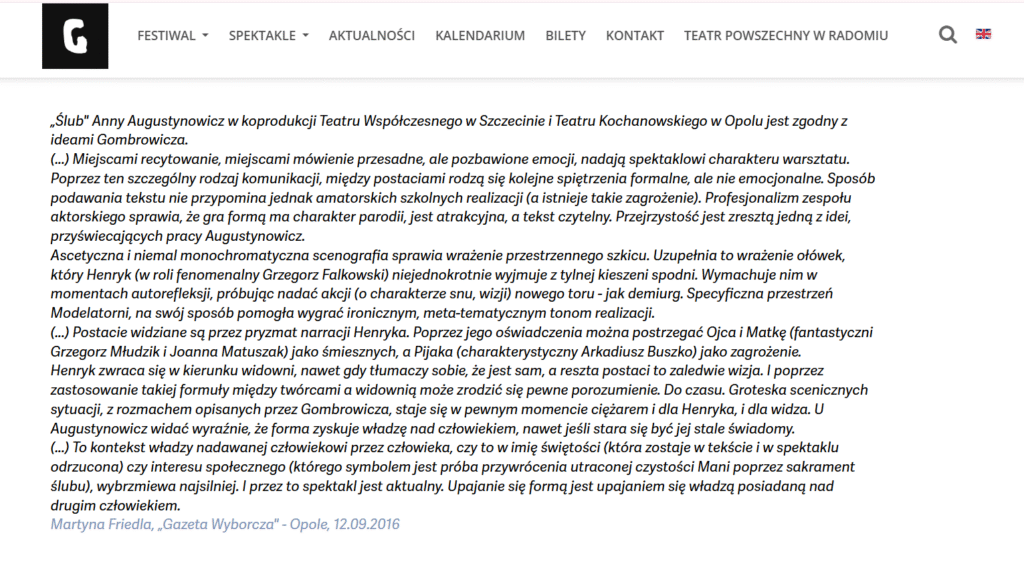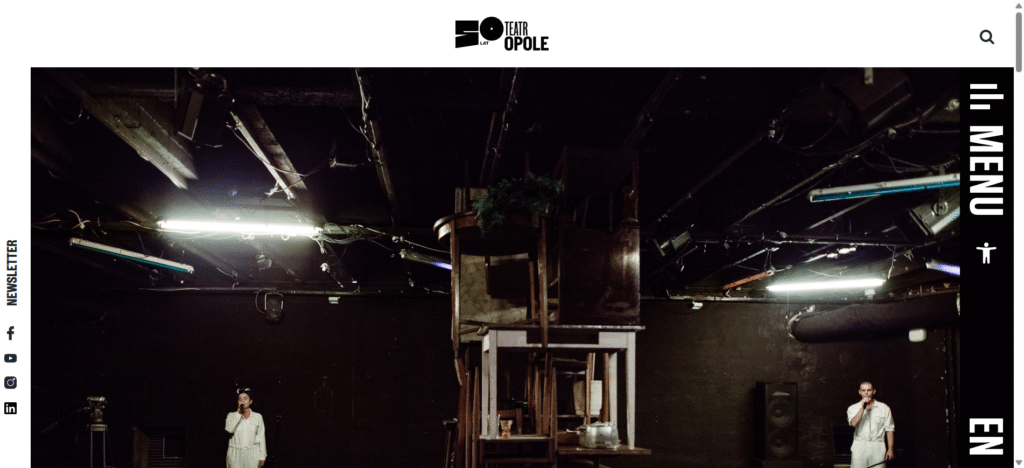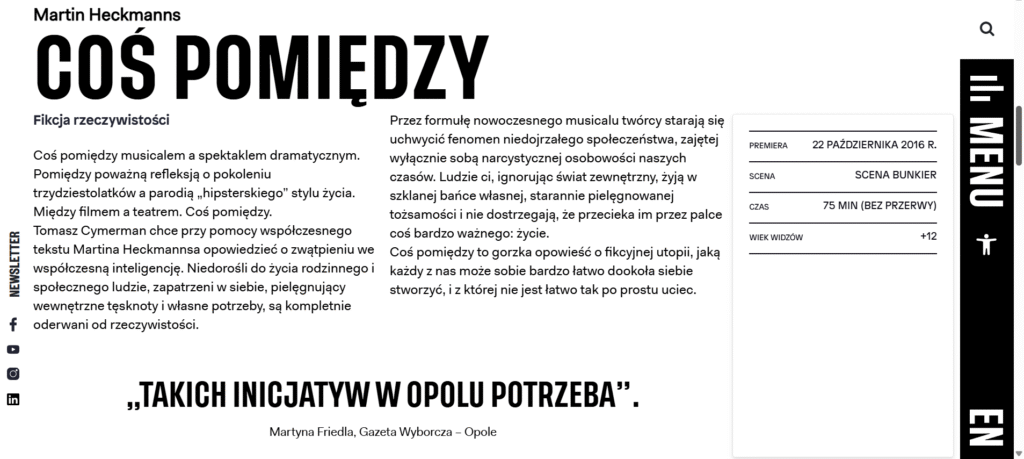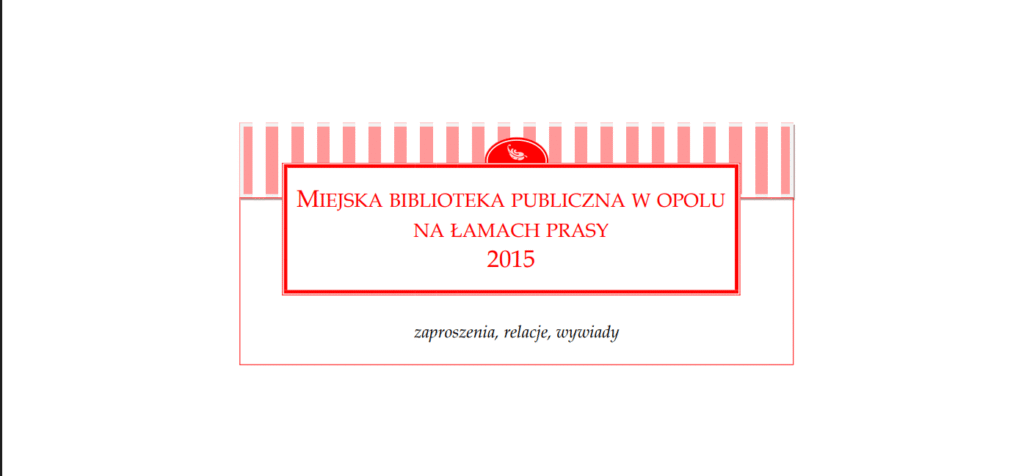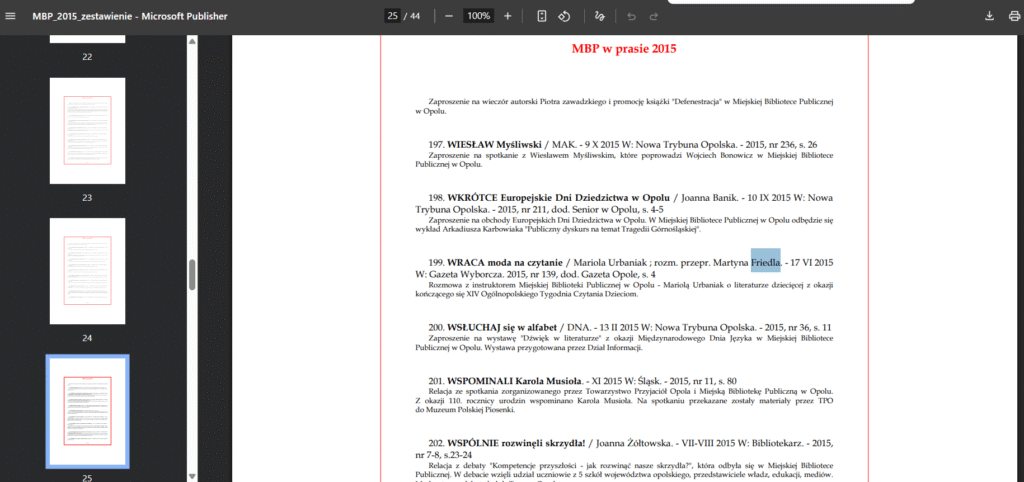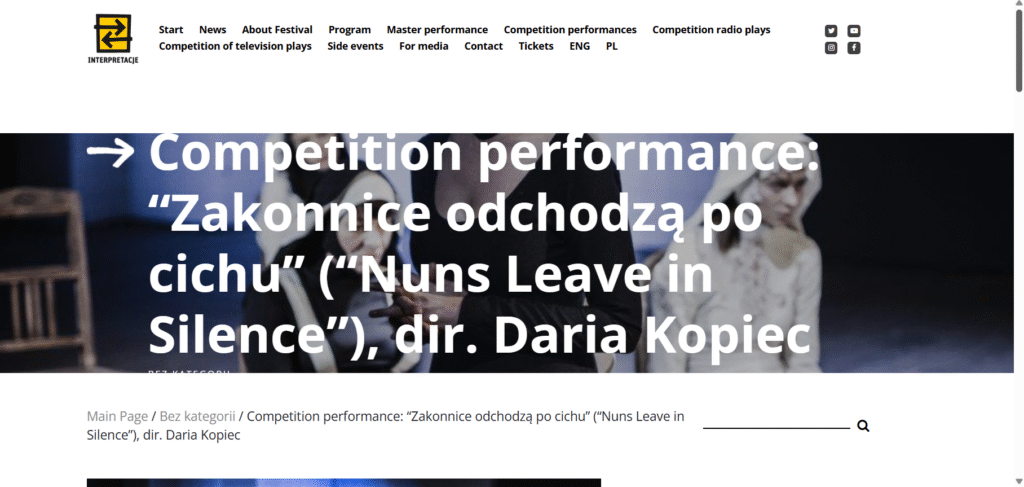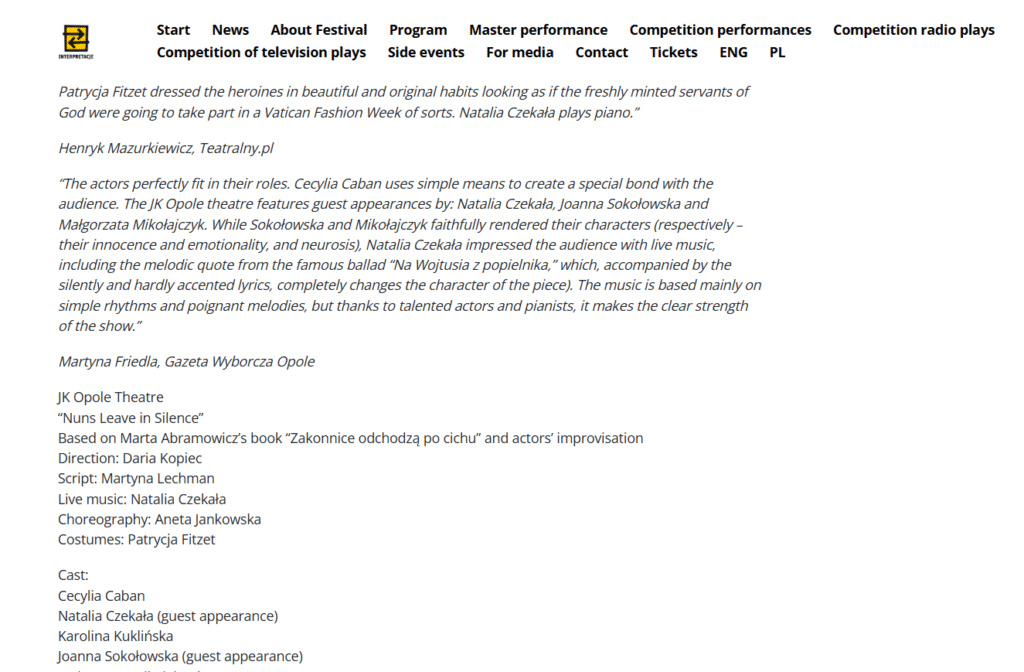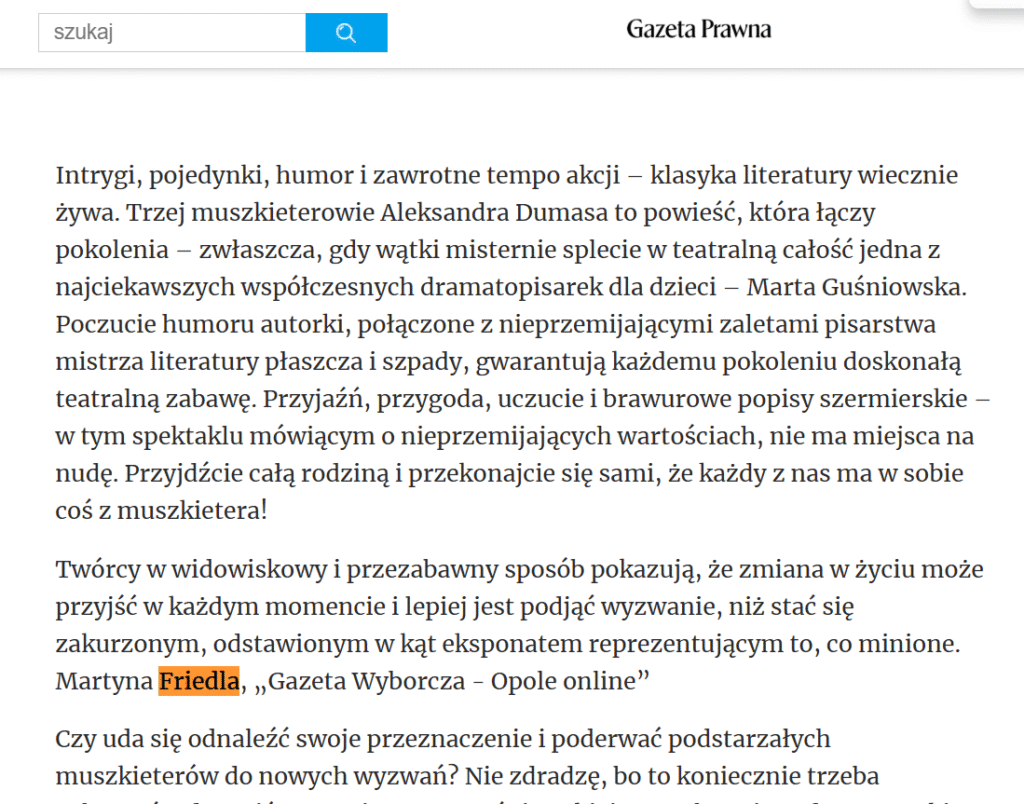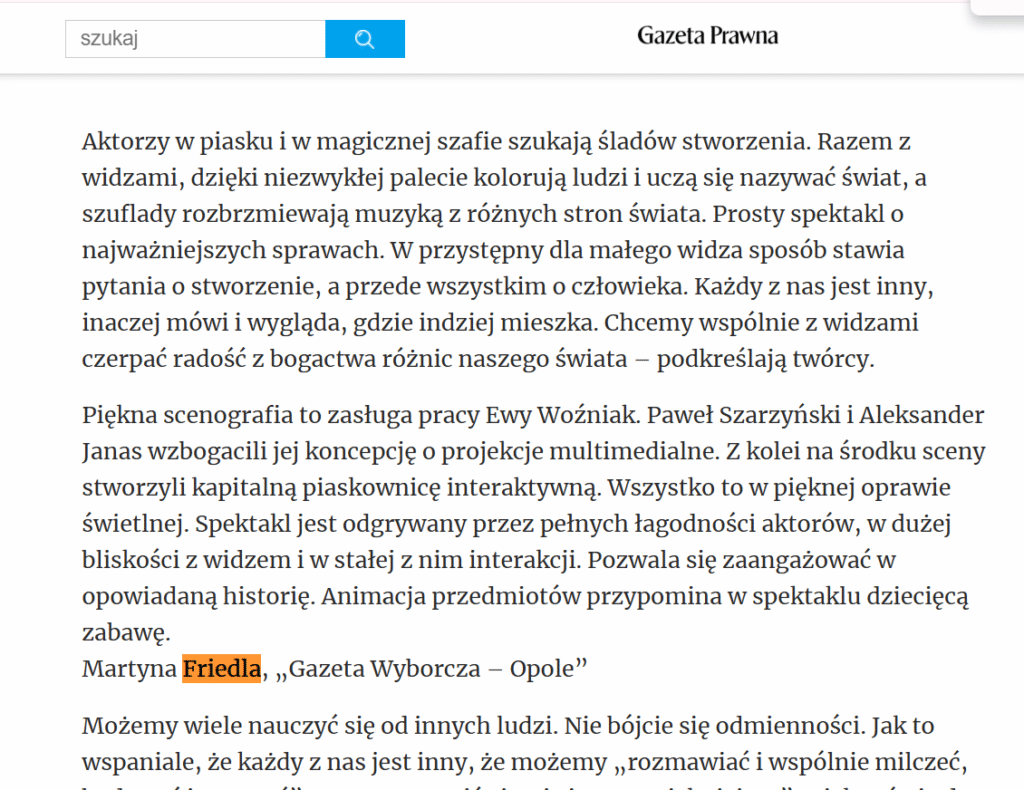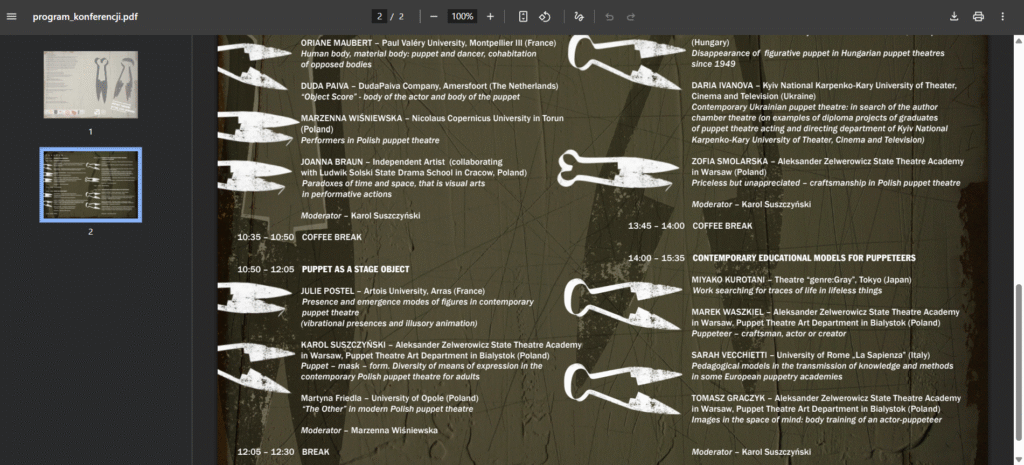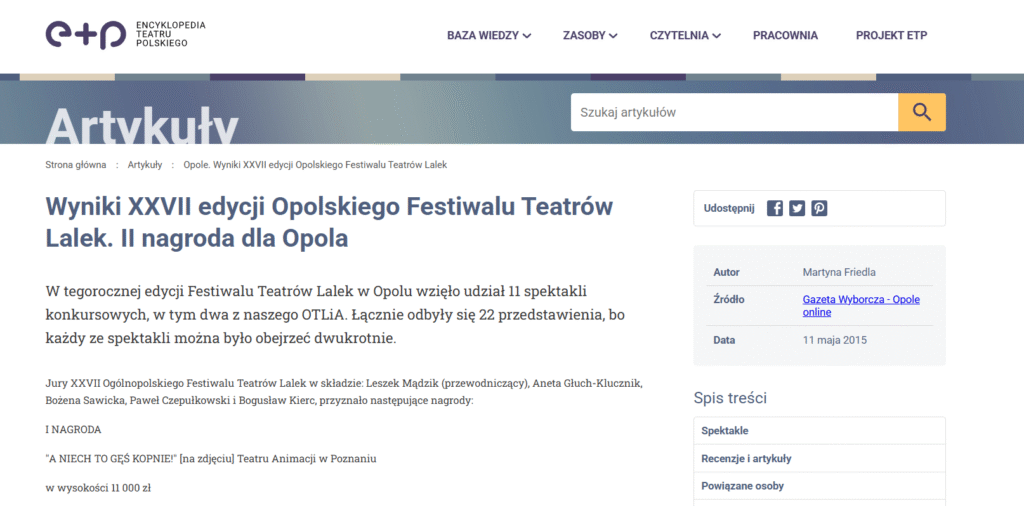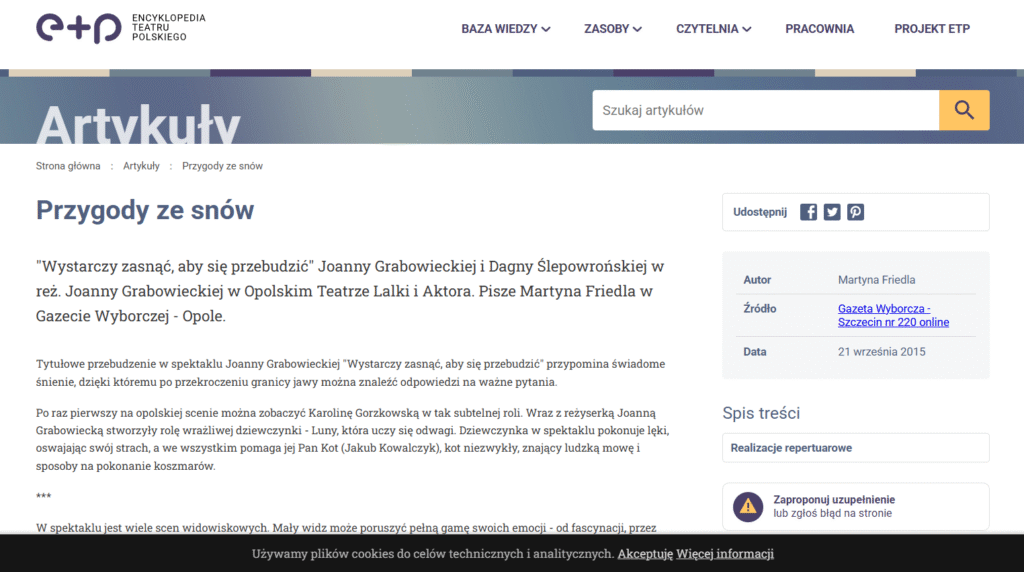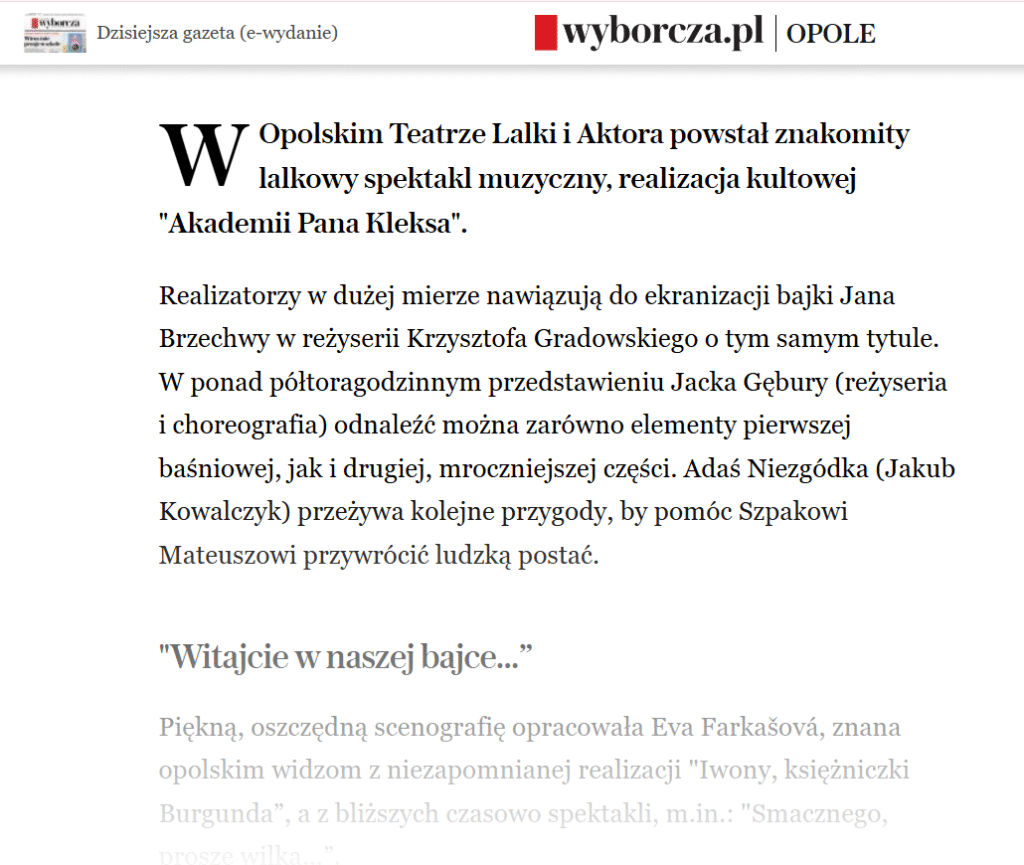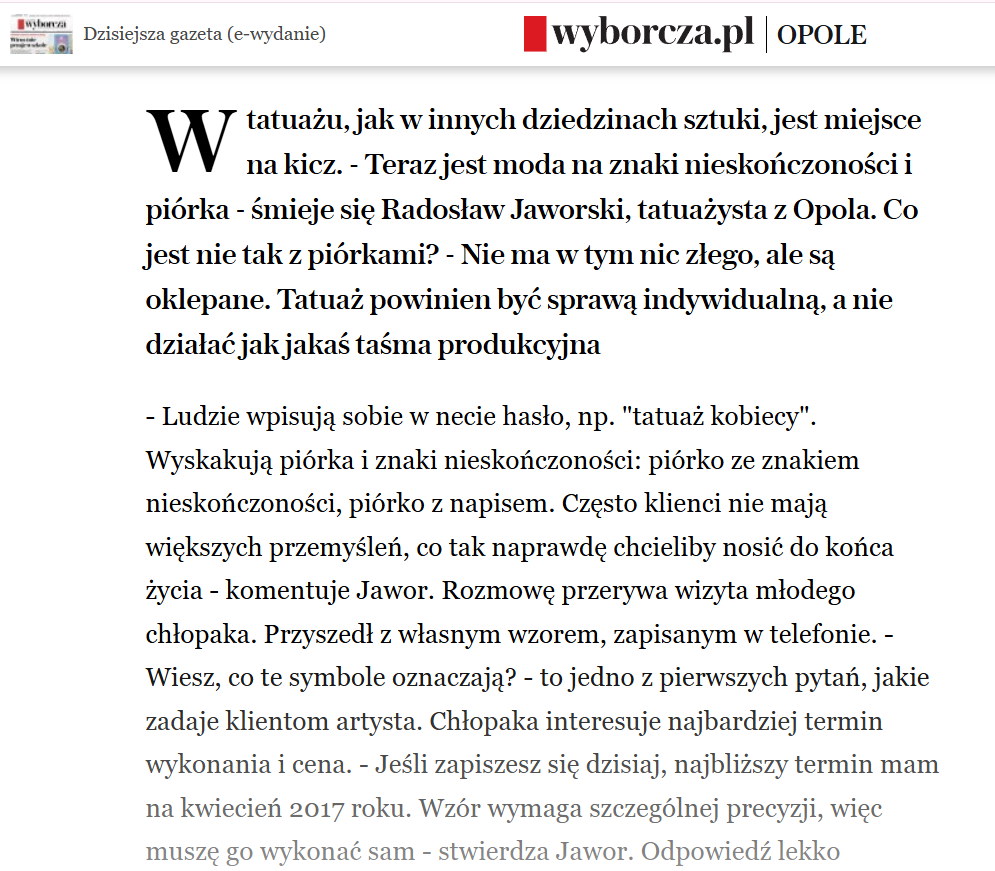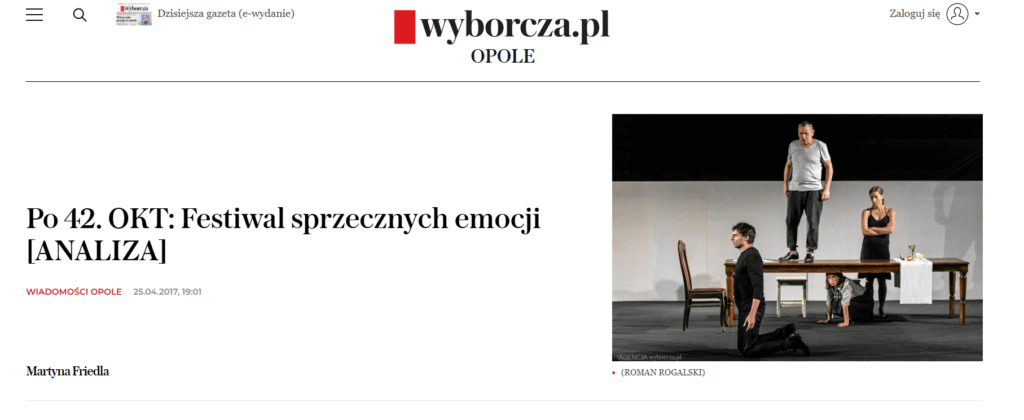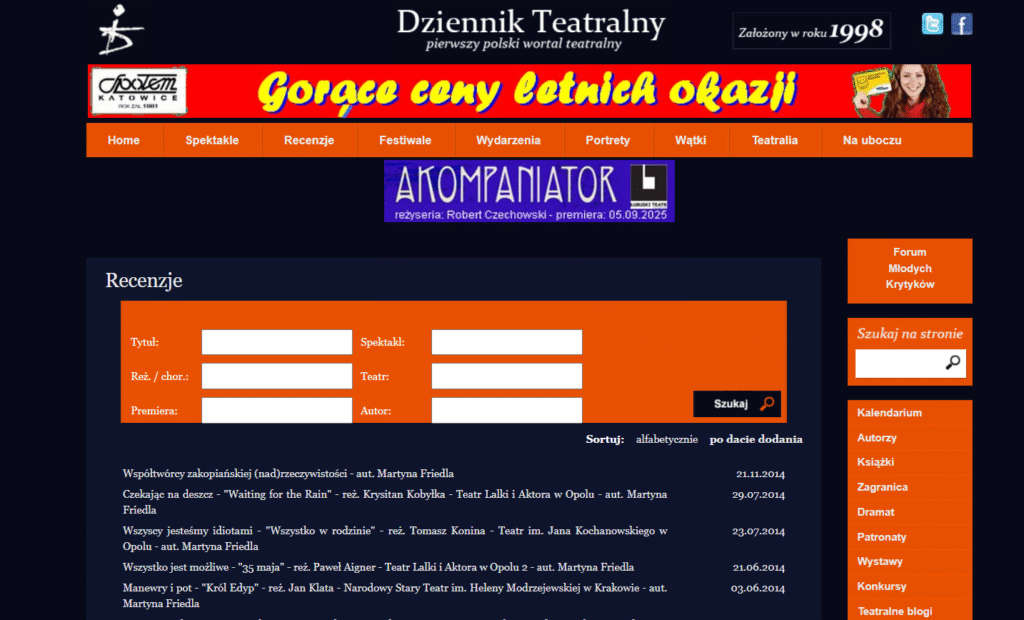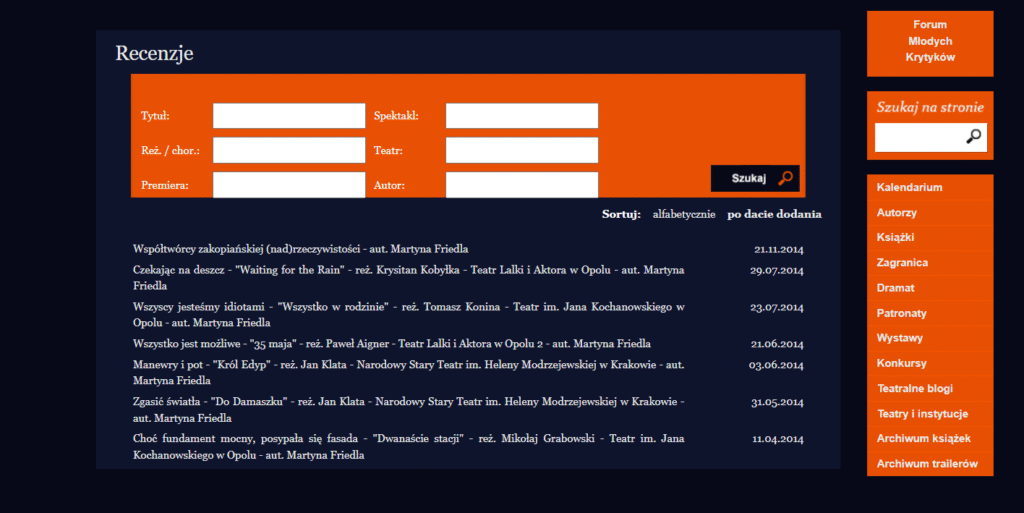
MEDIA O MOJEJ PRACY / GOŚCINNIE JAKO EKSPERTKA [media i wydarzenia] / PUBLIKACJE AKADEMICKIE / MOJE ARTYKUŁY PRASOWE, WYWIADY I RECENZJE
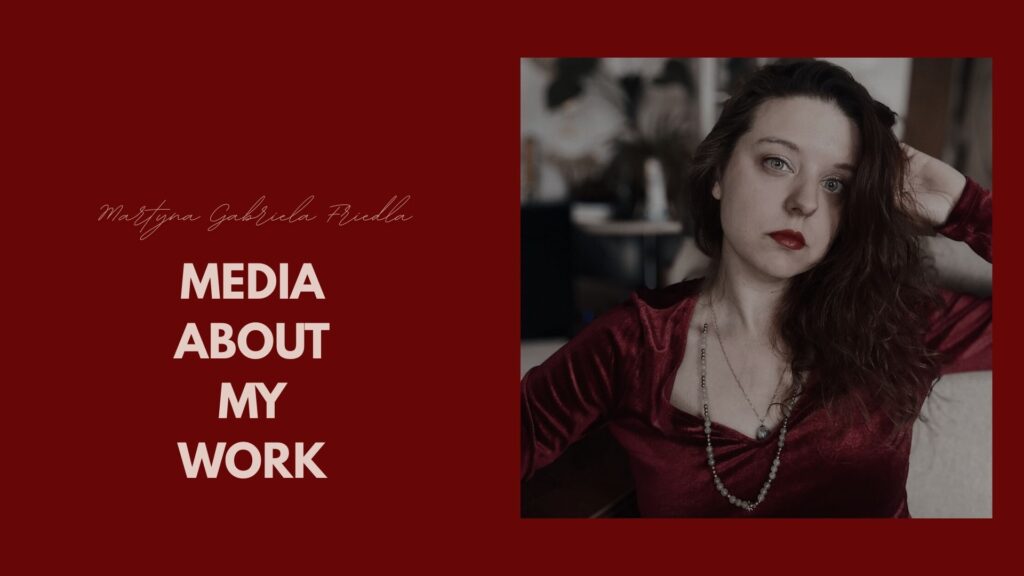
/ WYBRANE MEDIA O MOJEJ PRACY /
The Wild Medeina - Litwa / Wielka Brytania
Kilka cytatów z wywiadu dla The Wild Medeina
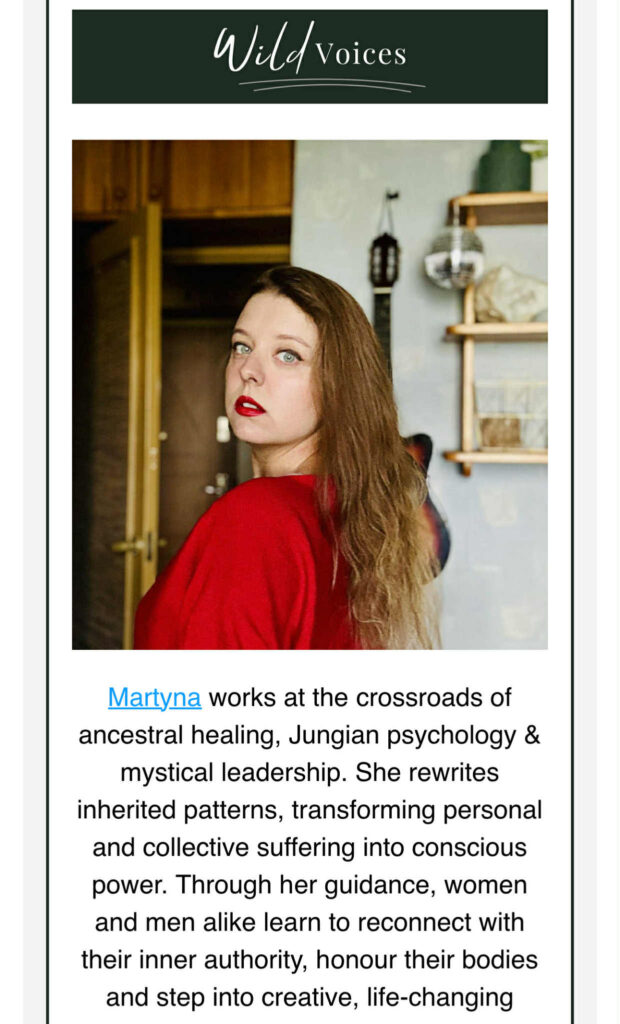
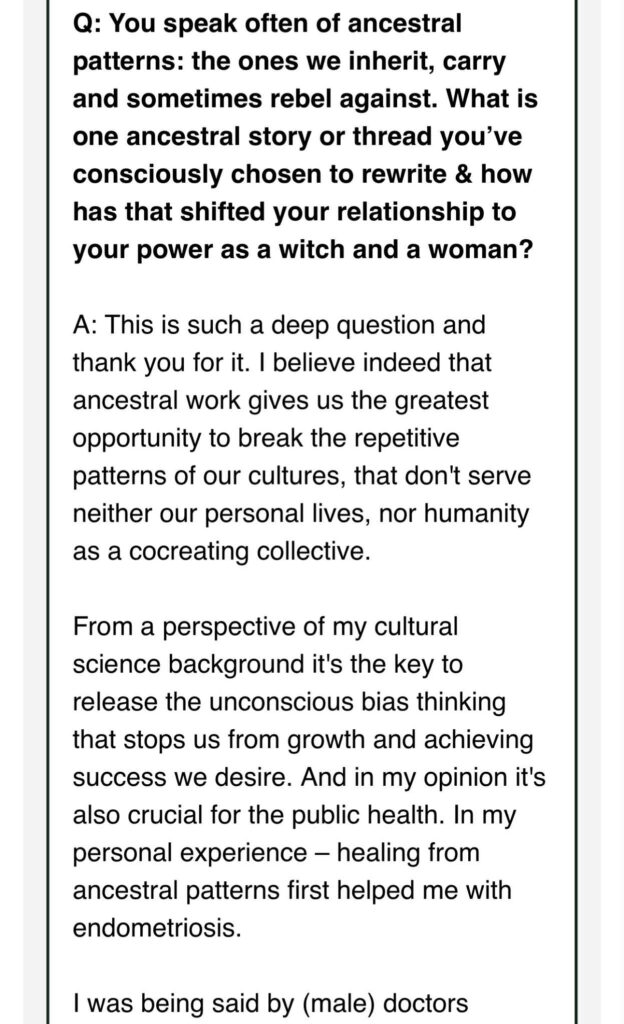
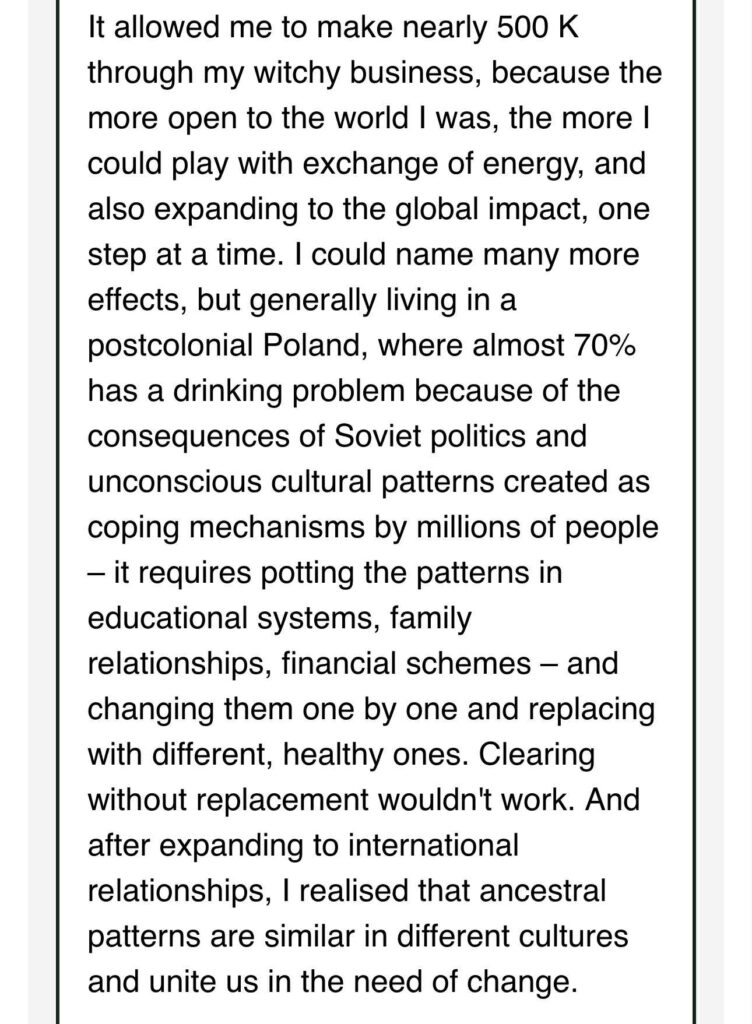
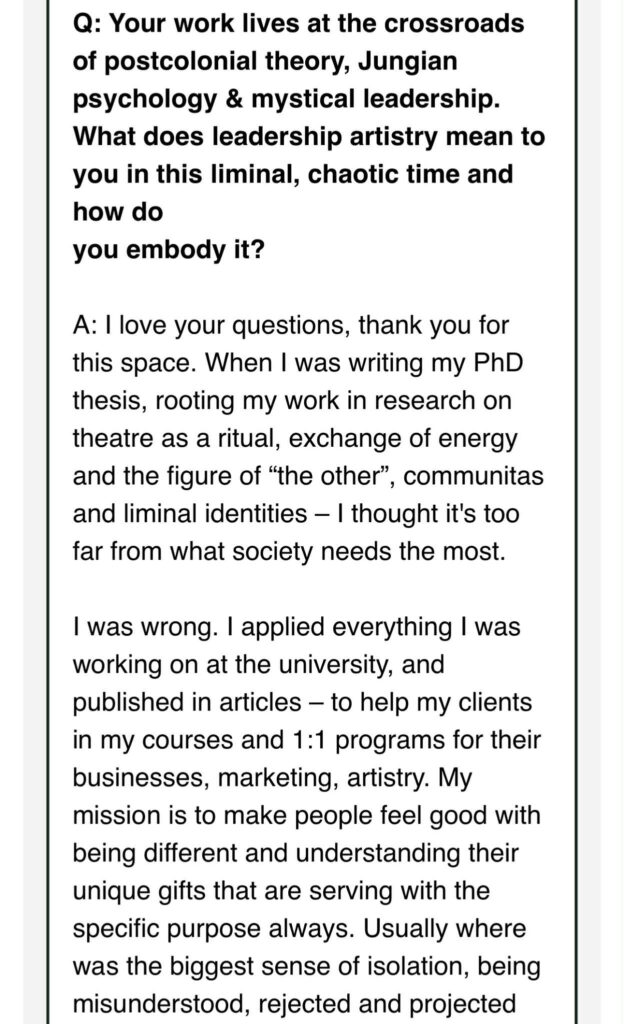
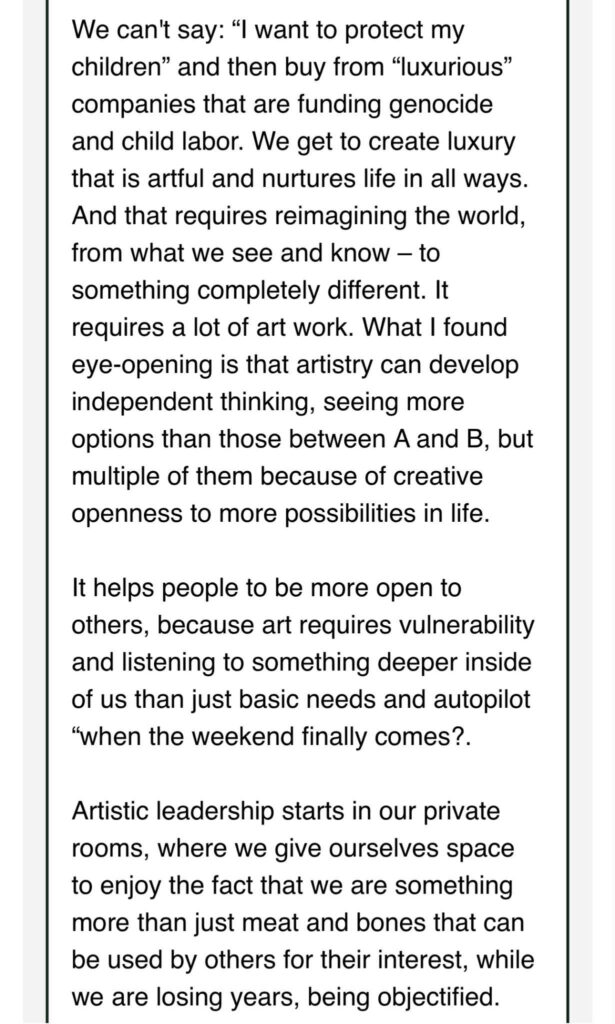
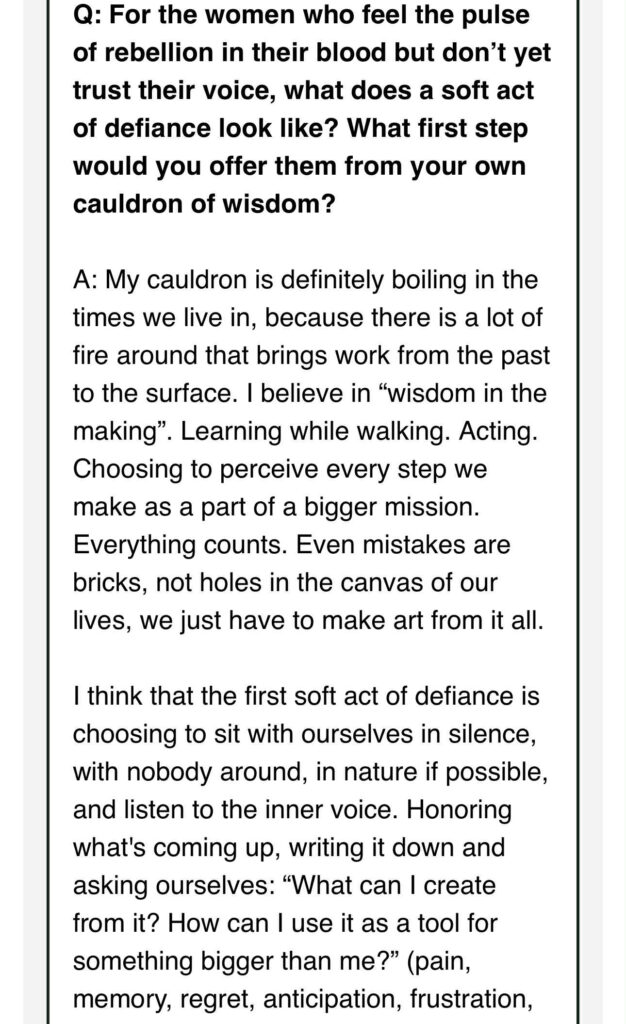

Polska
PISMO TEATR
Pismo "Teatr" to jedno z najważniejszych i jedno z dwóch - najstarszych pism o sztuce w Polsce. Posiada redakcję naukową. (Drugim jest "TWÓRCZOŚĆ").
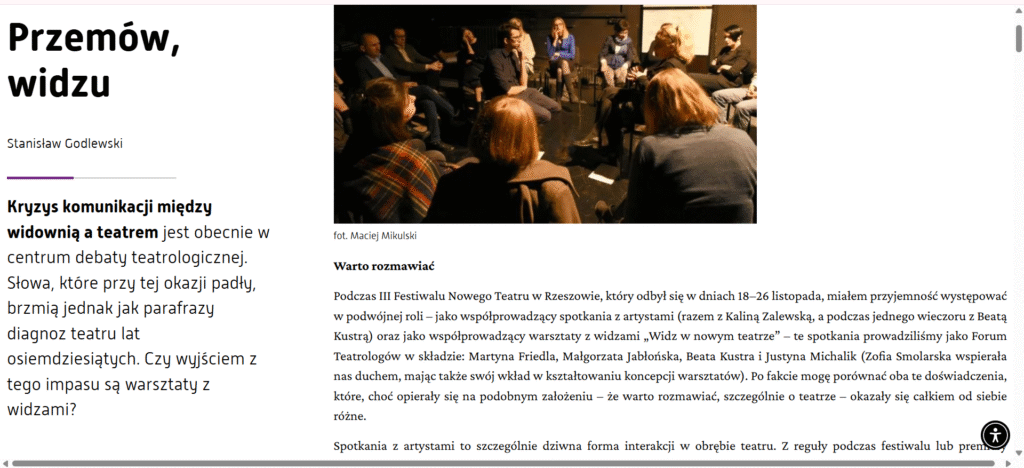
„Speak up, viewer”
Author: Stanisław Godlewski
„The crisis of communication between the audience and the theater is currently at the center of theatrical debate. However, the words spoken on this occasion sound like paraphrases of the theatrical diagnoses from the 1980s. Are workshops with the audience the way out of this impasse?
It’s worth having a conversation
During the third Festival of New Theater in Rzeszów, which took place from November 18th to 26th, I had the pleasure of participating in a dual role: as a co-host of meetings with artists, together with Kalina Zalewska, and on one evening with Beata Kustra, as well as a co-host of workshops with the audience titled “The Audience in the New Theater.” We conducted these meetings as the Theatrologists’ Forum, consisting of Martyna Friedla, Małgorzata Jabłońska, Beata Kustra, and Justyna Michalik. Zofia Smolarska supported us in spirit and also contributed to shaping the concept of the workshops. In hindsight, I can compare these two experiences, which, although based on a similar premise that it’s worth talking, especially about theater, turned out to be quite different from each other. Meetings with artists are a particularly strange form of interaction within the theater: usually, during a festival or a student premiere, the audience stays in their seats after the performance, while the artists sit on the stage together with the moderator of the meeting, who could be a theater critic, a theater pedagogue, a curator, or a researcher…”
TEATR LALEK
Pismo TEATR LALEK również posiada redakcję naukową i jest dotowane ze środków Ministerstwa Kultury i Dziedzictwa Narodowego.
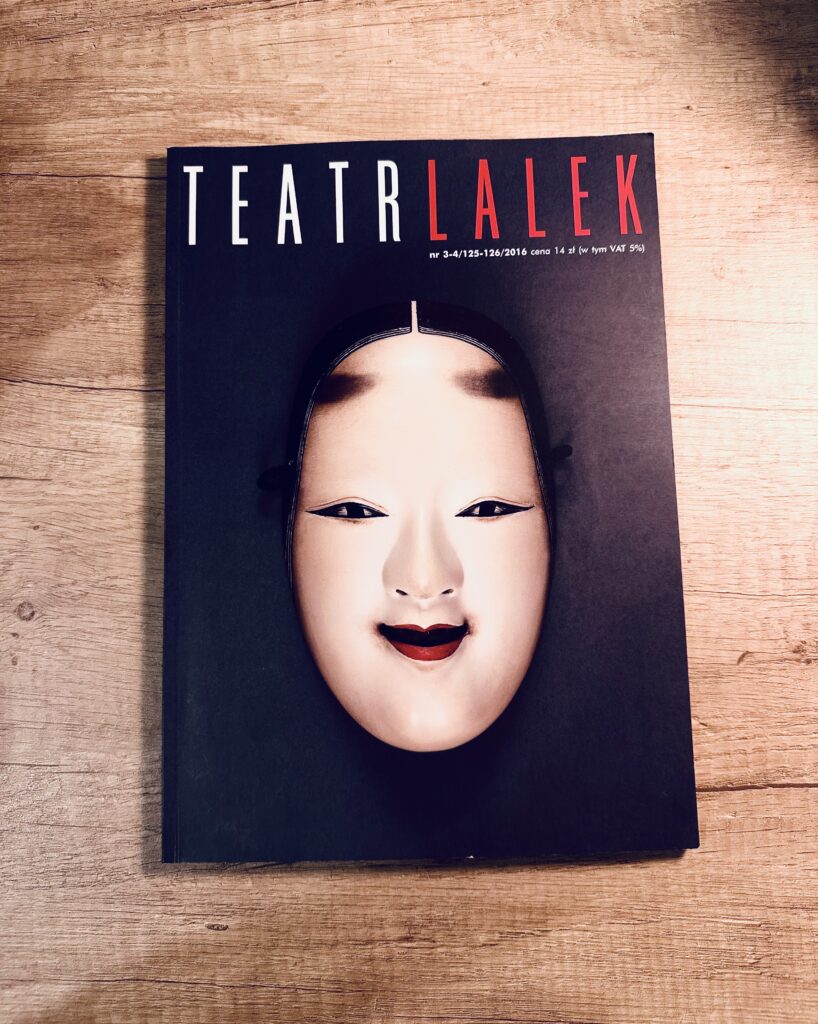
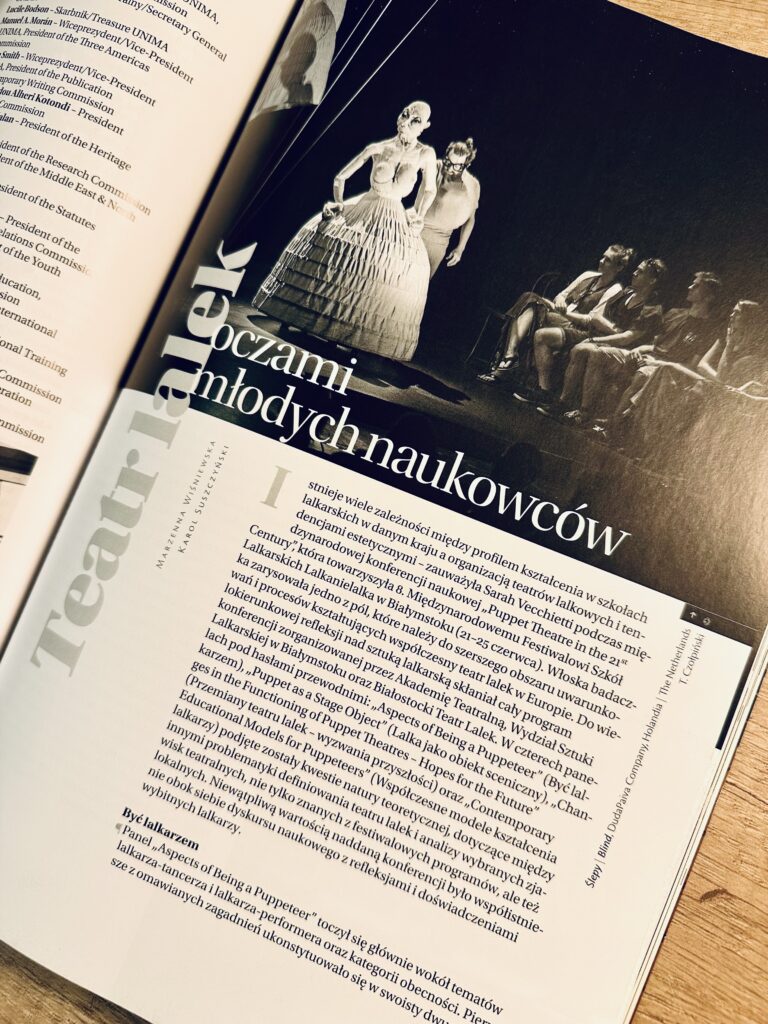

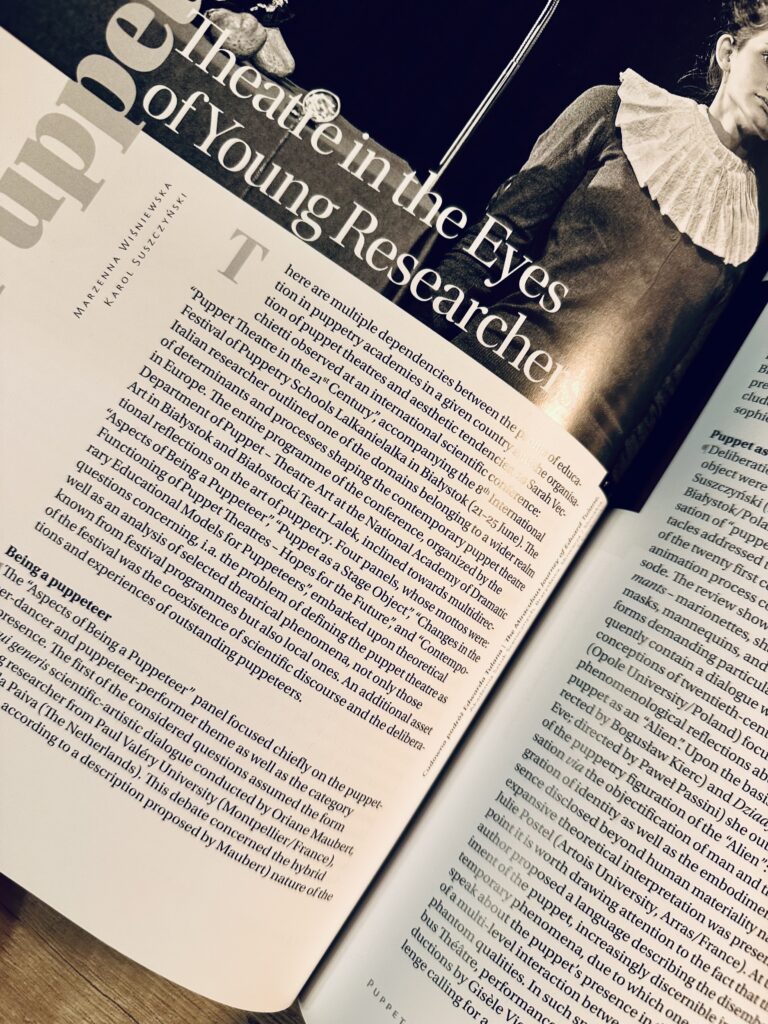
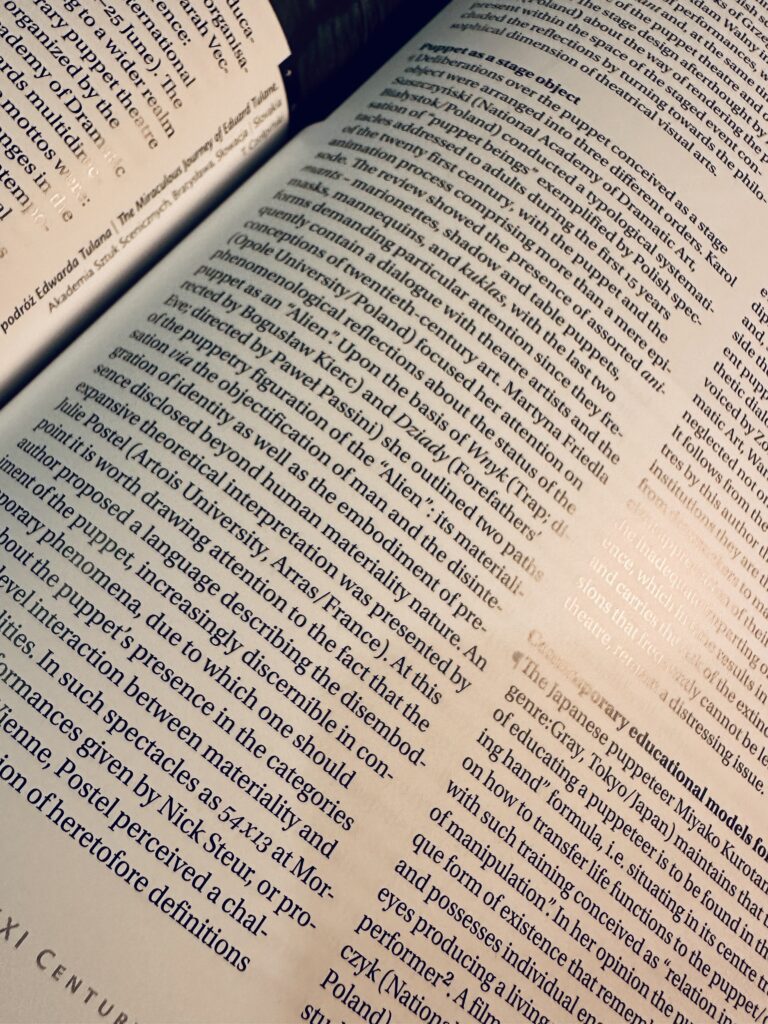
„At the end of the season, the creators of the theater in Sosnowiec will meet with the audience at a long table to talk in a relaxed atmosphere about the theater’s program, impressions, and the audience’s needs.
– While preparing the program for the upcoming season, we devote a lot of time to discussing the audience. We analyze attendance at individual performances and reflect on why some titles are more popular and others less so. We decided to meet with the viewers and talk about exactly this. To create a good space for conversation, we will use the Long Table format – says Aneta Groszyńska, Artistic Director of the Zagłębie Theater.
The Long Table is a discussion model that allows everyone who wishes to speak to do so in a democratic manner. The conversation unfolds in a relaxed atmosphere, without the authoritarian role of a moderator. The model originates from the performative practices of the famous American collective Split Britches. In Poland, it has been successfully used during festivals and workshops by the Forum of Theatrologists – a group of active researchers and commentators on contemporary theater. The workshop at the Zagłębie Theater will be led by representatives of the Forum: Martyna Friedla, Stanisław Godlewski, Małgorzata Jabłońska, Justyna Michalik, and Zofia Smolarska”.
POLSKIE TOWARZYSTWO BADAŃ TEATRALNYCH (Polish Theatre Research Society) O OGÓLNOPOLSKIM FORUM TEATROLOGÓW (The Theatre Scientists' Forum), KTÓRE WSPÓŁZAŁOŻYŁAM I WSPÓŁPROWADZIŁAM
e-teatr - strona Instytutu Teatralnego im. Zbigniewa Raszewskiego w Warszawie

„On November 25–26, 2016, at the Theatre Institute in Warsaw, a meeting of students, PhD candidates, and young researchers from all over Poland took place. Below you can read the report:
The first Forum of Theatrologists gathered 37 participants – students, doctoral candidates, and staff members of academic centers from across Poland (Warsaw, Kraków, Poznań, Wrocław, Łódź, Gdańsk, Lublin, Opole). Among the participants were young researchers of the performing arts, including drama, puppet theatre, and dance, as well as practitioners.
During two days filled with discussions, training sessions, and workshops, the participants managed to identify areas of interest for young theatrologists and establish a network of contacts, which resulted in the creation of several working groups. Thanks to the invited guests (Prof. Małgorzata Sugiera, Anna Galas, Dr. Agata Łuksza, Karolina Wycisk), participants broadened their knowledge about national and international grants as well as opportunities for cooperation with NGOs.
Equally important – also in the context of PTBT’s development plans – was Dr. Dominika Łarionow’s presentation on the functioning of working groups within FIRT, which served as a point of reference for shaping our own research teams. This constructive approach was accompanied by critical reflection and a conversation on the meaning and future of writing about theatre, which we conducted using the “Long Table” method – a form of democratic, “self-moderating” discussion still unfamiliar in Poland.

We achieved two of our intended goals. First, we brought together young researchers from various centers in a format other than a traditional academic conference. Second, by equalizing the level of knowledge about research funding opportunities, we created an atmosphere conducive to developing research initiatives that transcend divisions between institutions and sub-disciplines.
Of course, we were not able to address all the issues and concerns important to the younger generation. Participants expressed the need to meet again, with one of the proposals being to organize the next Forum during the 3rd PTBT Congress in 2017.
The organizers would like to thank the Theatre Institute for providing the space, covering accommodation costs for participants from outside Warsaw, and for the warmth and belief in the value of this meeting. It is also very important to us that the Forum took place under the auspices of the Polish Society for Theatre Research. This is a sign to young researchers that they are not working in a vacuum and that the path to cooperation between Forum participants and the Society is open.
Signed: Martyna Friedla, Stanisław Godlewski, Małgorzata Jabłońska, Justyna Michalik, and Zofia Smolarska”.
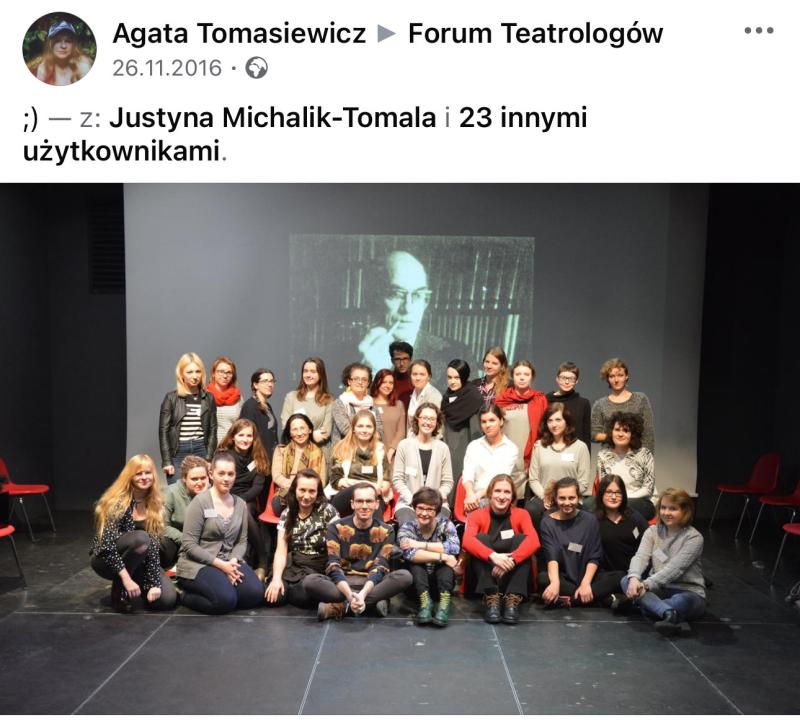
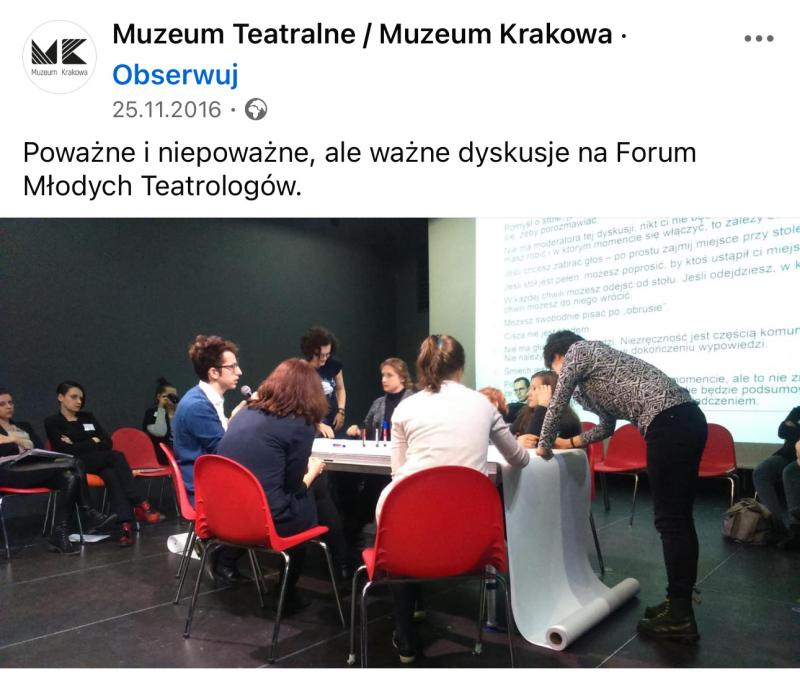
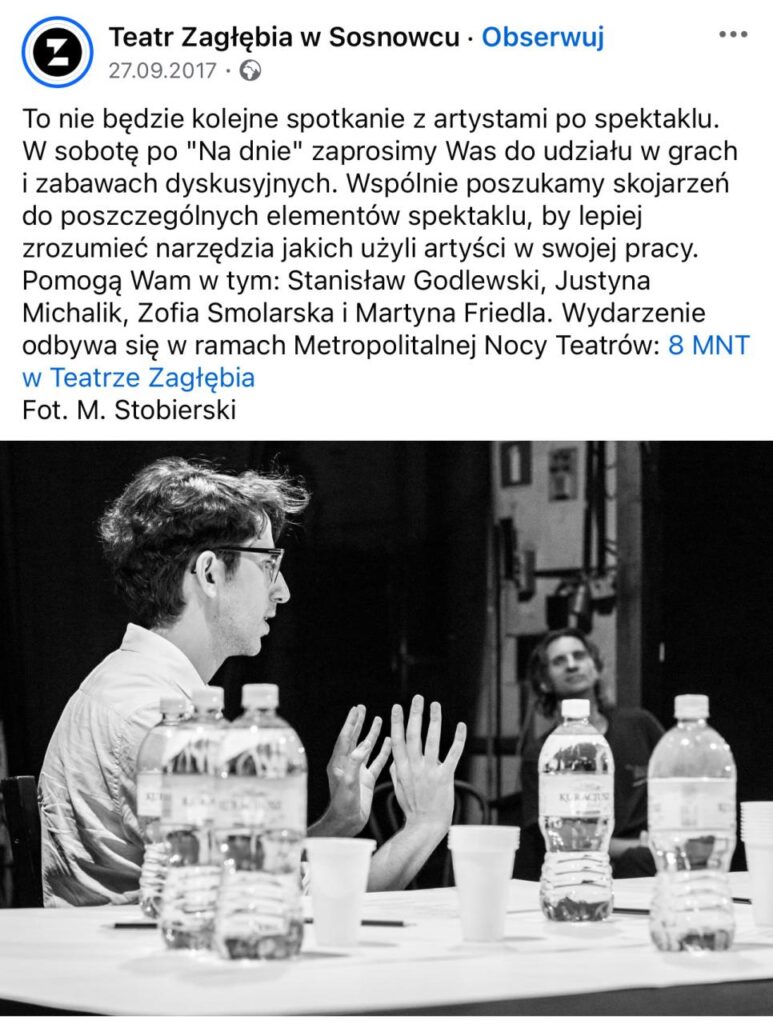
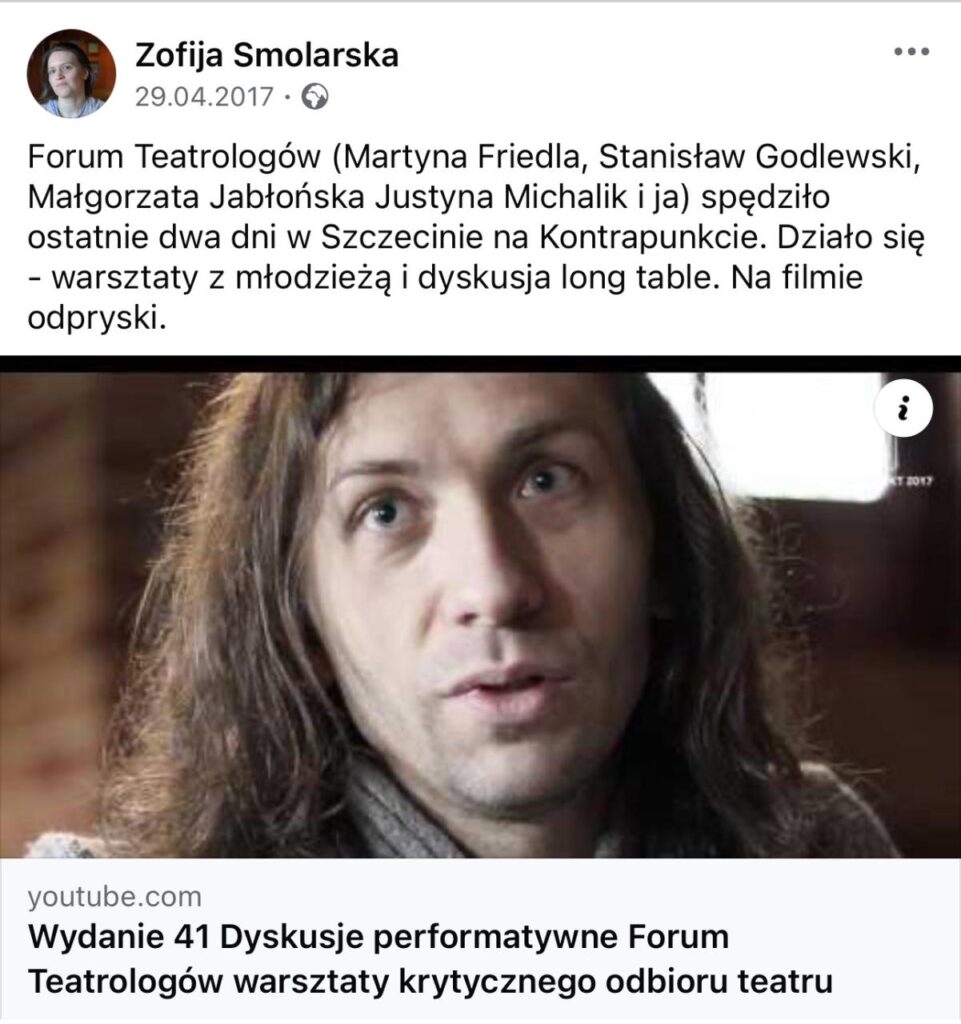
STRONA INSTYTUTU KULTURY WSPÓŁCZESNEJ UNIWERSYTETU ŁÓDZKIEGO
e-teatr - strona Instytutu Teatralnego im. Zbigniewa Raszewskiego w Warszawie
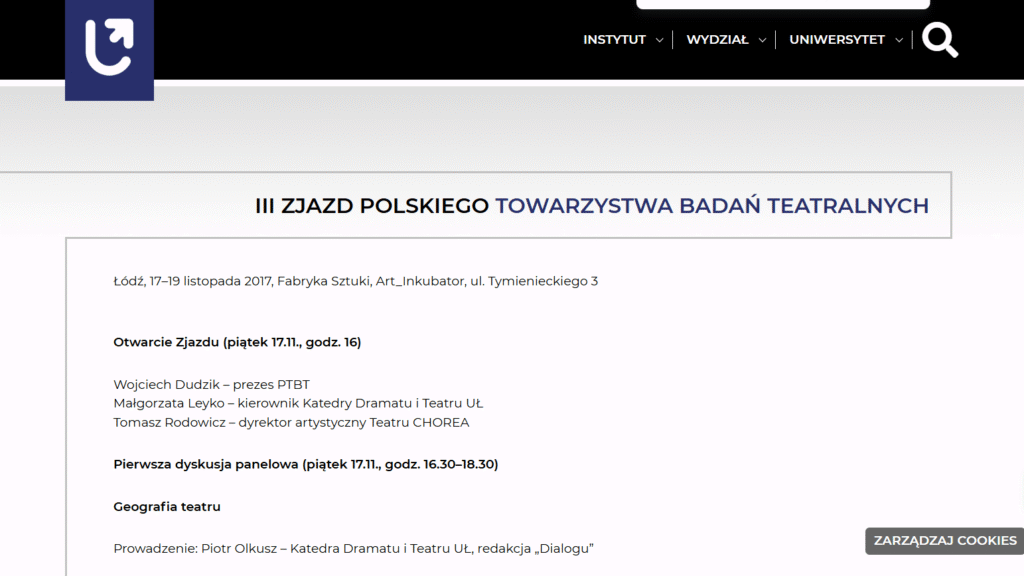
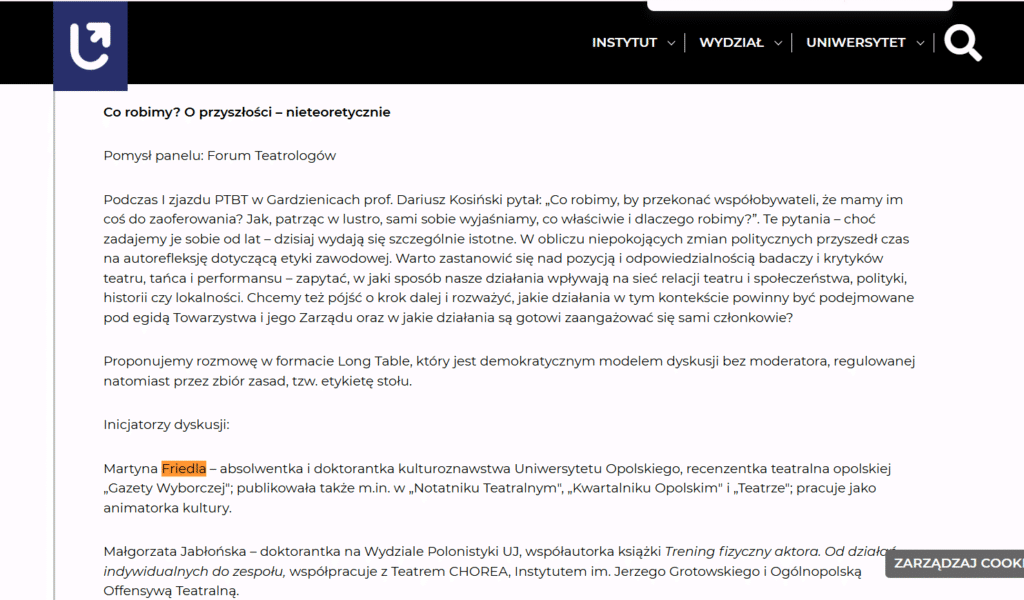
„What Do We Do? On the Future – Not Theoretically
Panel idea: Forum of Theatrologists
During the 1st PTBT Congress in Gardzienice, Prof. Dariusz Kosiński asked: “What are we doing to convince our fellow citizens that we have something to offer them? How, looking in the mirror, do we explain to ourselves what exactly we are doing and why?” These questions – although we have been asking them for years – seem particularly relevant today. In the face of troubling political changes, it is time for self-reflection concerning professional ethics. It is worth considering the position and responsibility of researchers and critics of theatre, dance, and performance – asking how our actions affect the network of relations between theatre and society, politics, history, or locality.
We also want to go one step further and reflect on what kinds of actions, in this context, should be undertaken under the auspices of the Society and its Board, and what kinds of initiatives the members themselves are ready to commit to.
We propose a conversation in the Long Table format, which is a democratic model of discussion without a moderator, yet regulated by a set of rules – the so-called table etiquette.
Discussion initiators:
Martyna Friedla – graduate and doctoral candidate in cultural studies at the University of Opole, theatre reviewer for the Opole edition of Gazeta Wyborcza; she has also published in Notatnik Teatralny, Kwartalnik Opolski, and Teatr; works as a cultural animator”.
WYBRANE CYTOWANIA
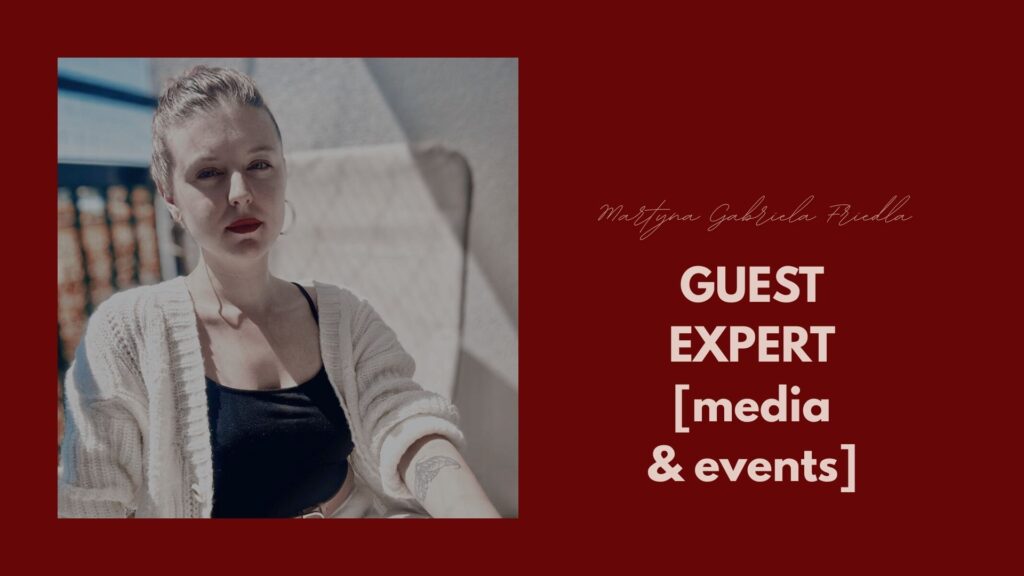
/ GOŚCINNIE JAKO EKSPERTKA [media i wydarzenia] /
W 2020 roku prowadziłam międzypokoleniowe warsztaty teatralne, dzięki współpracy z Fundacją w Rozwoju (FUNDACJA W ROZWOJU).
TERENOWE WARSZTATY KRYTYKA TEATRALNEGO
(DLA UNIWERSYTETU OPOLSKIEGO)
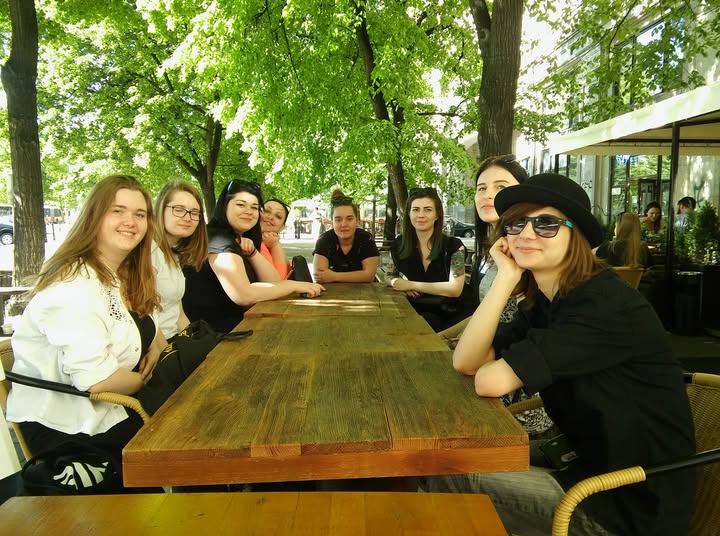
PEŁNIĄCA FUNKCJE KIEROWNIKA LITERACKIEGO W OPOLSKIM TEATRZE LALKI I AKTORA
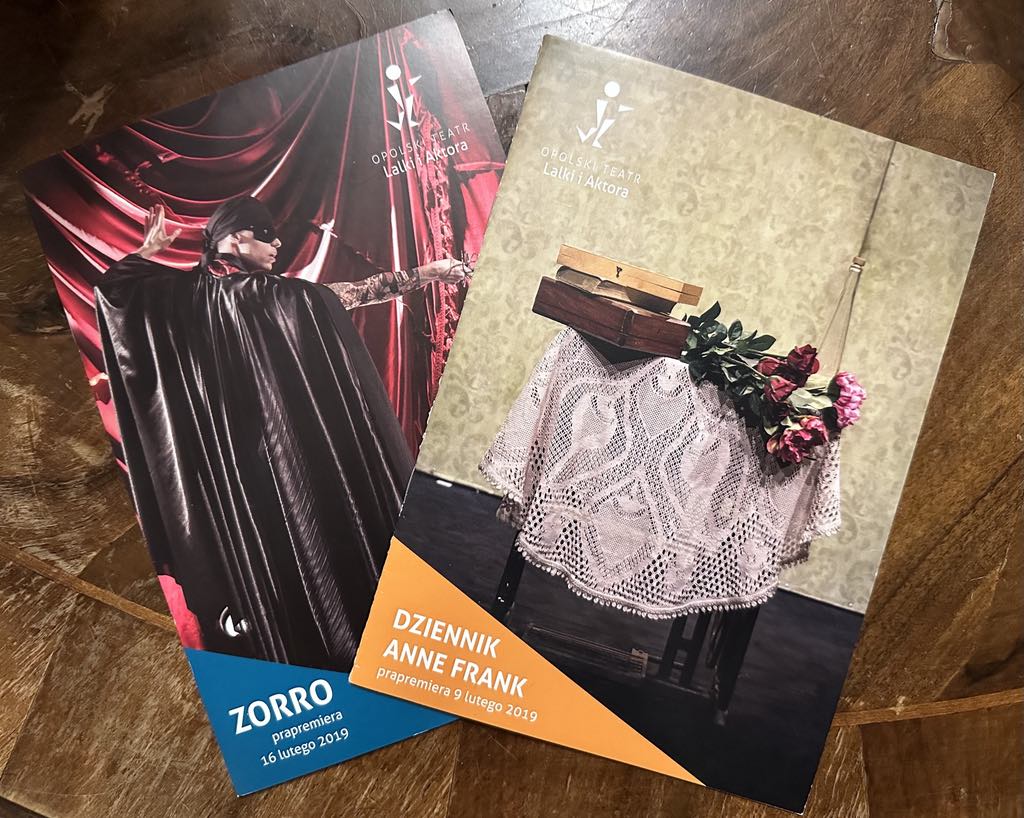
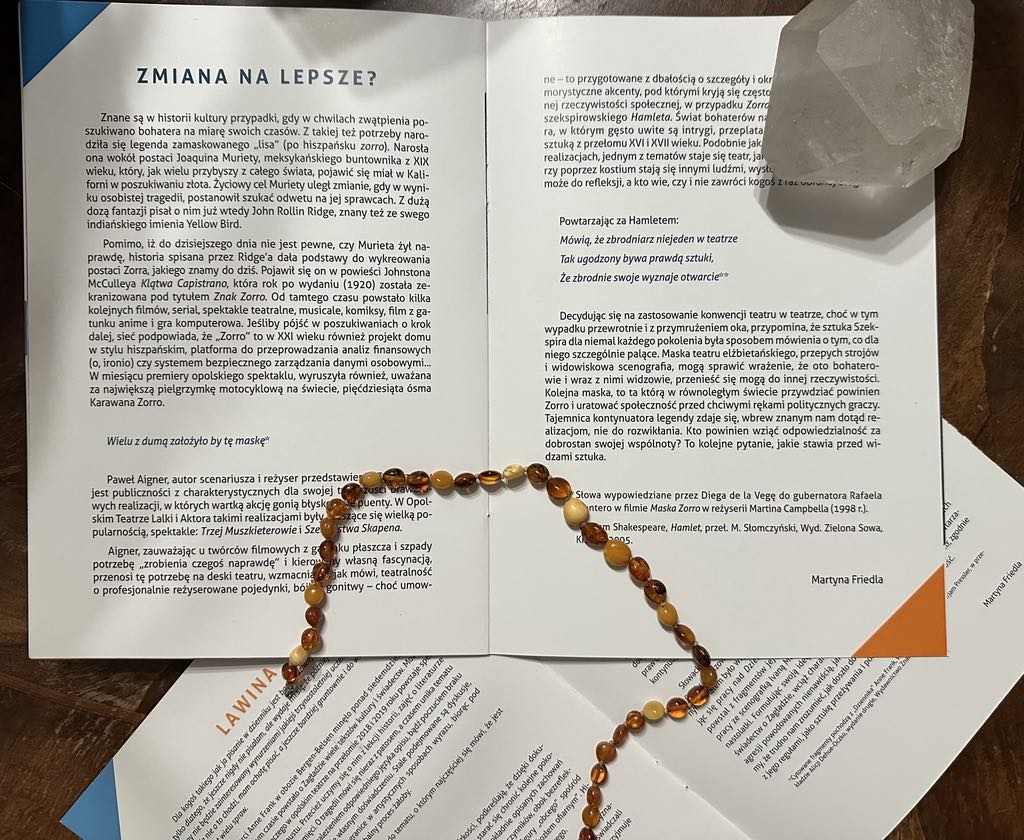
OGÓLNOPOLSKIE KONFERENCJE NAUKOWE I KONFERENCJE WYDZIAŁOWE
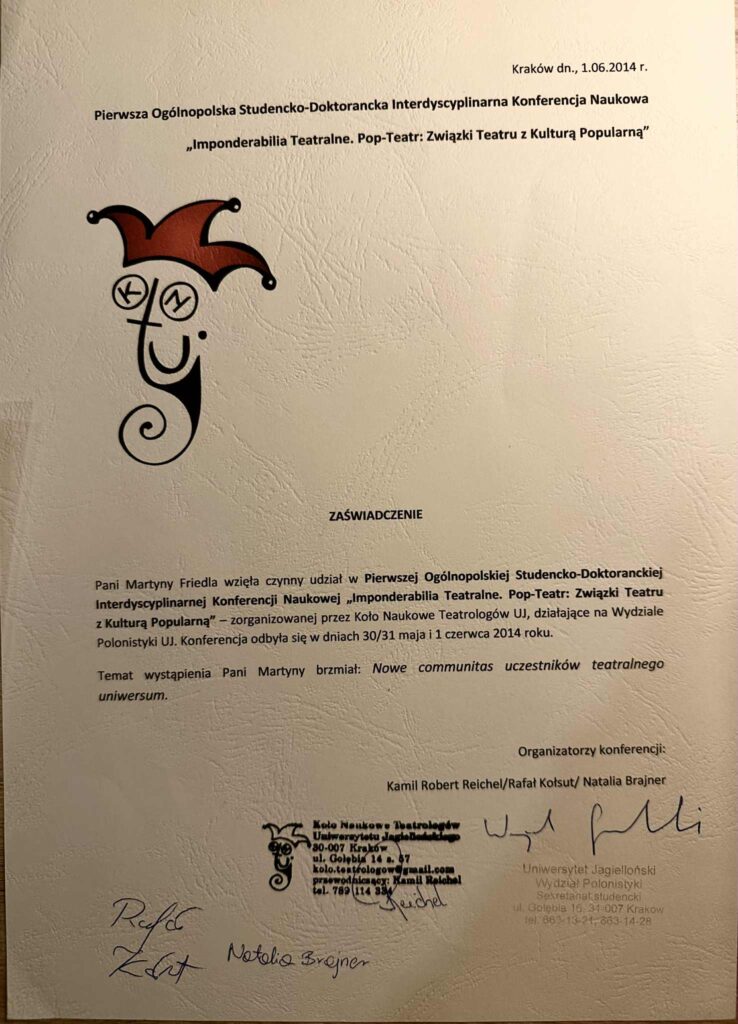
„The first nationwide interdisciplinary scientific conference for students and PhD candidates: Imponderabilia of Theatre – Pop Theatre – The Connections Between Theatre and Popular Culture.
The conference was organized by the Theatrologists’ Scientific Circle at Jagiellonian University, operating within the Faculty of Polish Studies at Jagiellonian University. The conference took place on May 30–31 and June 1, 2014.
The topic of Ms. Martyna’s presentation was “New Communitas of the Participants of the Theatre Universe.”
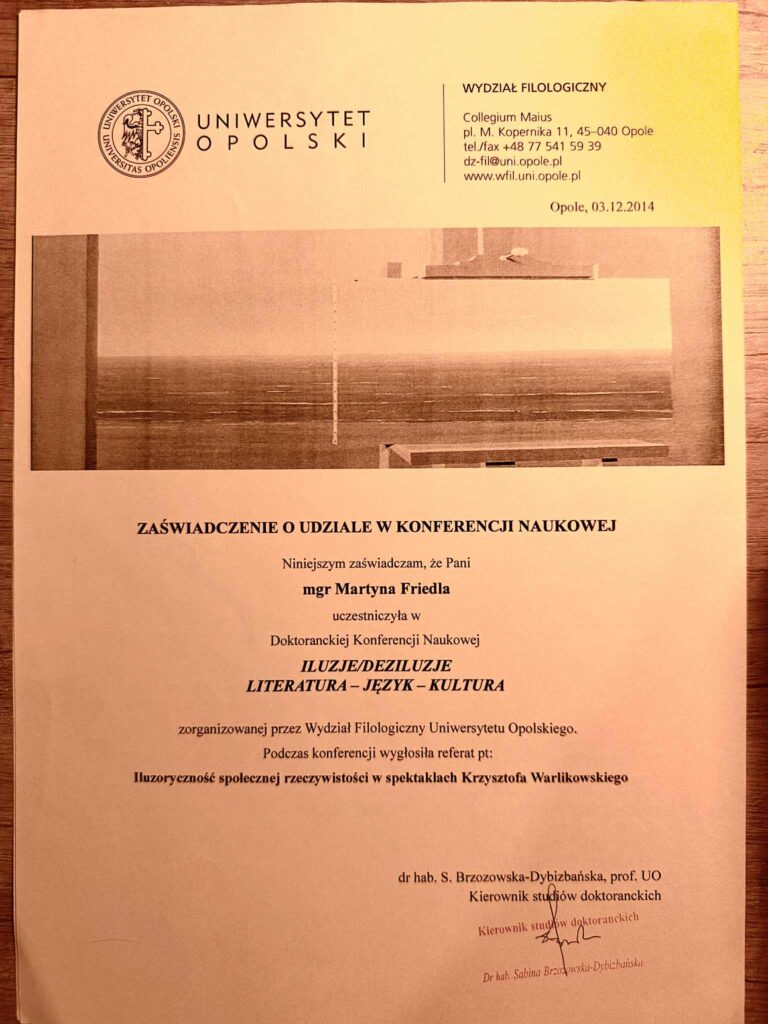
Opole University, Faculty of Philology
Certificate of Participation in the Scientific Conference.
„This is to certify that Ms. Martyna Friedla participated in the doctoral scientific conference titled “Illusions/Disillusions: Literature, Language, and Culture,” organized by the Faculty of Philology at Opole University.
During the conference, she delivered a paper entitled “The Illusory Nature of Social Reality in Krzysztof Walikowski’s Spectacles.”
OPOLSKA WIOSNA PSYCHOLOGICZNA
Psychologia sztuką życia
KONFERENCJA "Psychologia w teatrze. Teatr w psychologii"
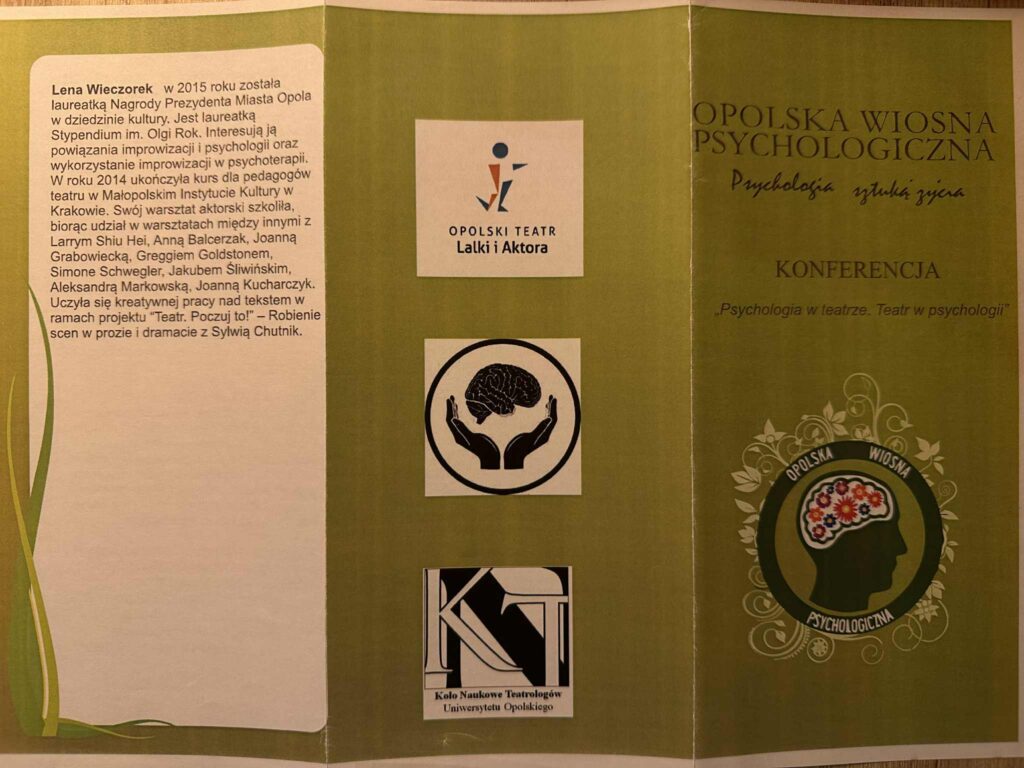
Podczas tego wydarzenia zajmowałam się współprowadzeniem dyskusji i pomocą w organizacji tego wydarzenia w Opolskim Teatrze Lalki i Aktora we współpracy z psychologami z Uniwersytetu Opolskiego.
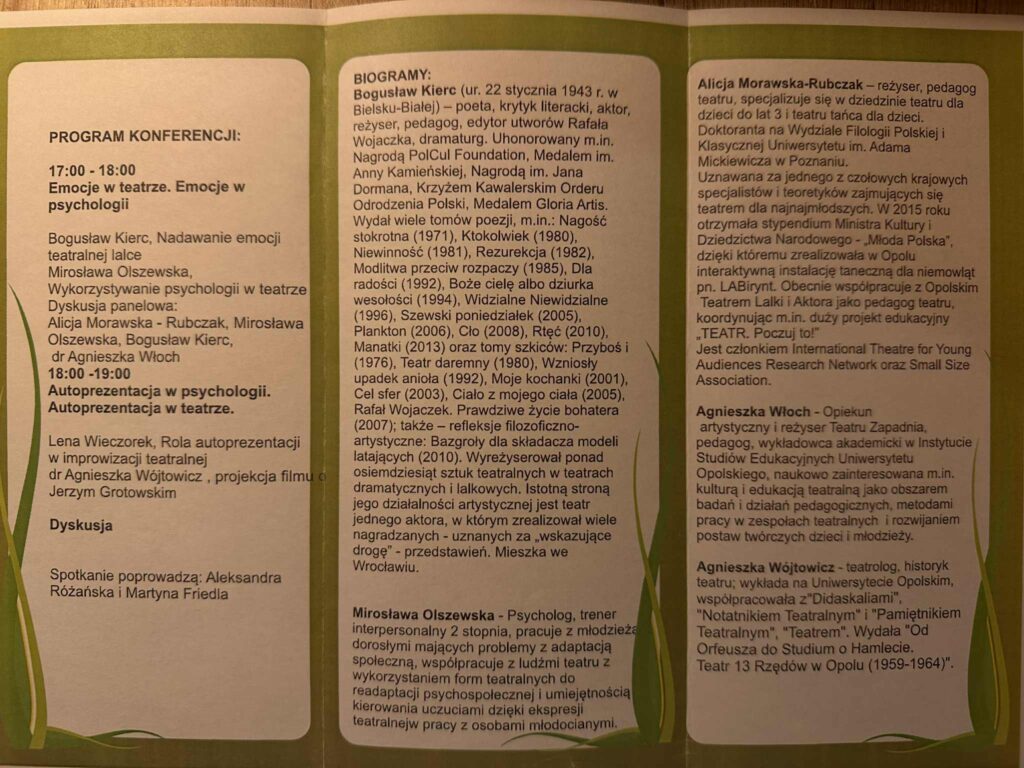
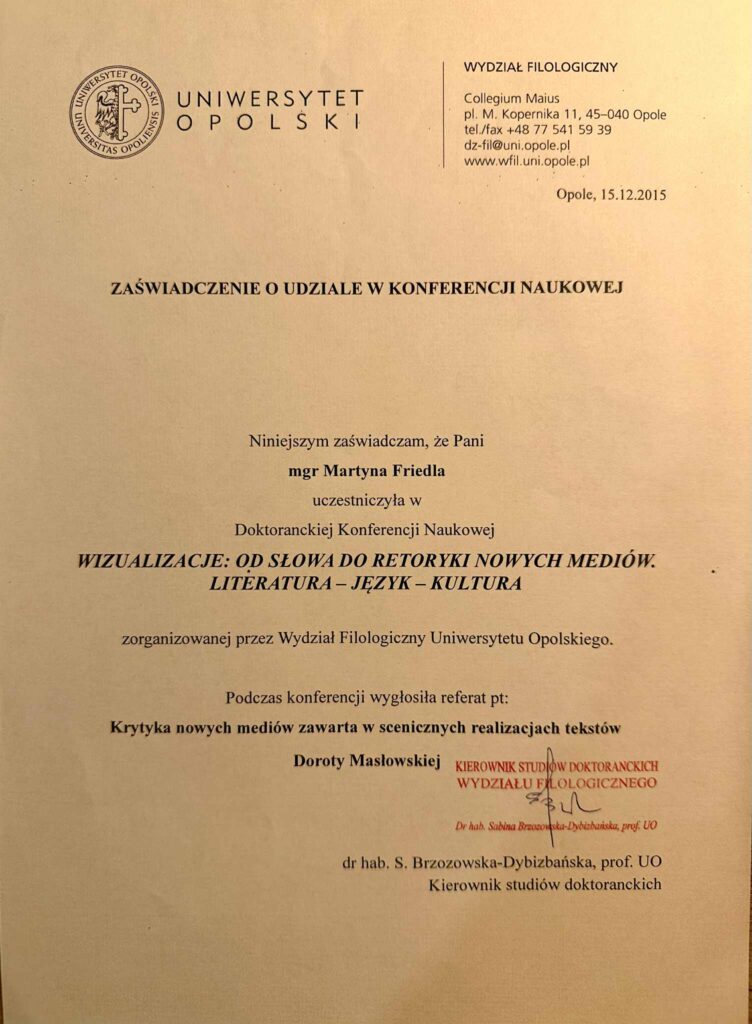
Opole University, Faculty of Philology
„Certificate of Participation in the Scientific Conference.
This is to certify that Ms. Martyna Friedla participated in the doctoral scientific conference titled “Visualization: From Word to the Rhetoric of New Media, Literature, Language, and Culture,” organized by the Faculty of Philology at Opole University.
During the conference, she delivered a paper entitled “Critique of New Media in the Stage Realizations of Dorota Masłowska’s Texts.”
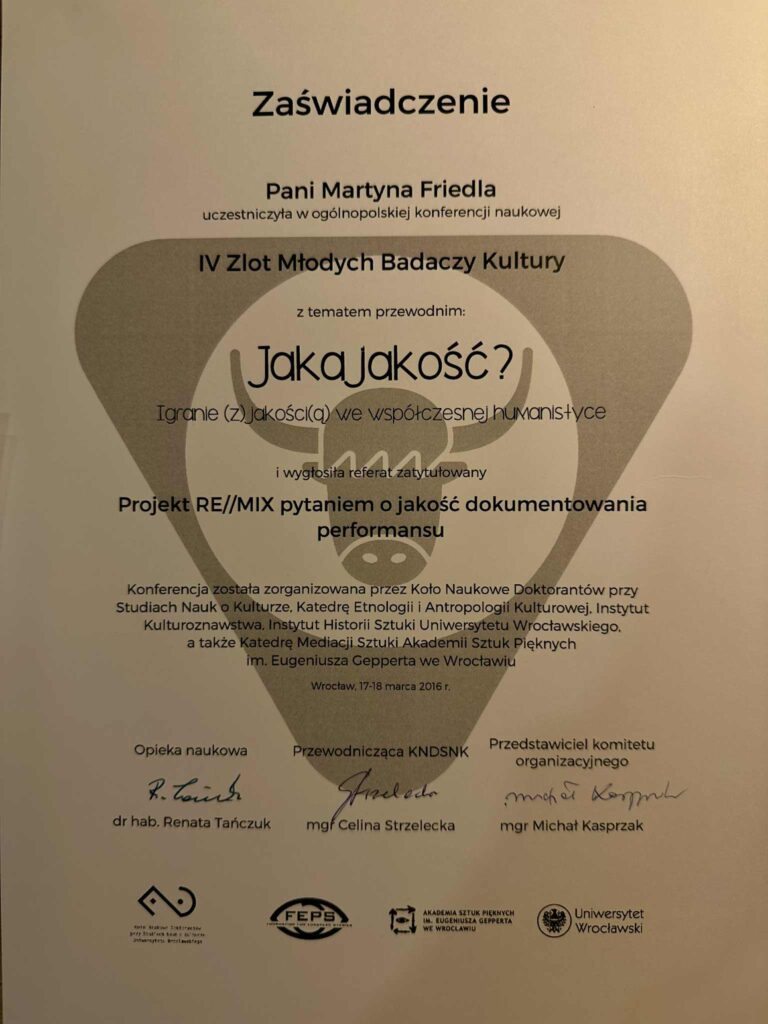
Certificate
„Ms. Martyna Friedla participated in the national scientific conference “The Fourth Gathering of Young Culture Researchers” with the main theme “What Quality and Playing with Quality in Contemporary Humanities,” and she delivered a paper titled “The RE//MIX Project: A Question of Quality in Documenting Performance.”
The conference was organized by the Doctoral Students’ Scientific Circle at the Department of Cultural Studies, the Department of Ethnology and Cultural Anthropology, the Institute of Cultural Studies, the Institute of Art History at the University of Wrocław, as well as the Department of Art Mediation at the Eugeniusz Geppert Academy of Fine Arts in Wrocław”.
OGÓLNOPOLSKA KONFERENCJA NAUKOWA, KTÓRĄ ZORGANIZOWAŁAM
Konferencja, którą zainicjowałam, nie miałaby miejsca, gdyby nie współorganizacja doktorantów Pauliny Gowin, Łukasza Słońskiego, studentów Łukasza Koziołka, Adrianny Warzechy, Anety Plinty i pozostałych zaangażowanych członków Koła Naukowego Teatrologów i przyjaciół oraz poparcie przedstawicieli kadry Uniwersytetu Opolskiego, dr Agnieszki Wójtowicz i dr hab. Sabiny Brzozowskiej-Dybizbańskiej, prof. Uniwersytetu Opolskiego.
Jestem też wdzięczna Miejskiej Bibliotece w Opolu za udostępnienie nam swojej pięknej galerii, w której mogliśmy wymienić się refleksjami z ludźmi z całego kraju przez te dwa dni.
Konferencja miała mieć swoje zwieńczenie w postaci książki, rozpoczęliśmy nad nią prace, a Uniwersytet Opolski był gotów finansować to przedsięwzięcie, niestety z przyczyn zdrowotnych musiałam zrezygnować.
Do zorganizowania konferencji zainspirowało mnie wydanie pisma Kultura Współczesna: "Kultura wernakularna. Pamięć – wyobraźnia – praktyki oporu", a profesor Marcin Napiórkowski, przewodniczący badaniom, które zawierają się w tym numerze pisma, odpowiedział na nasze zaproszenie i poprowadził wykład gościnny. Kultura Współczesna. Teoria, Interpretacje, Praktyka nr 3(87)/2015
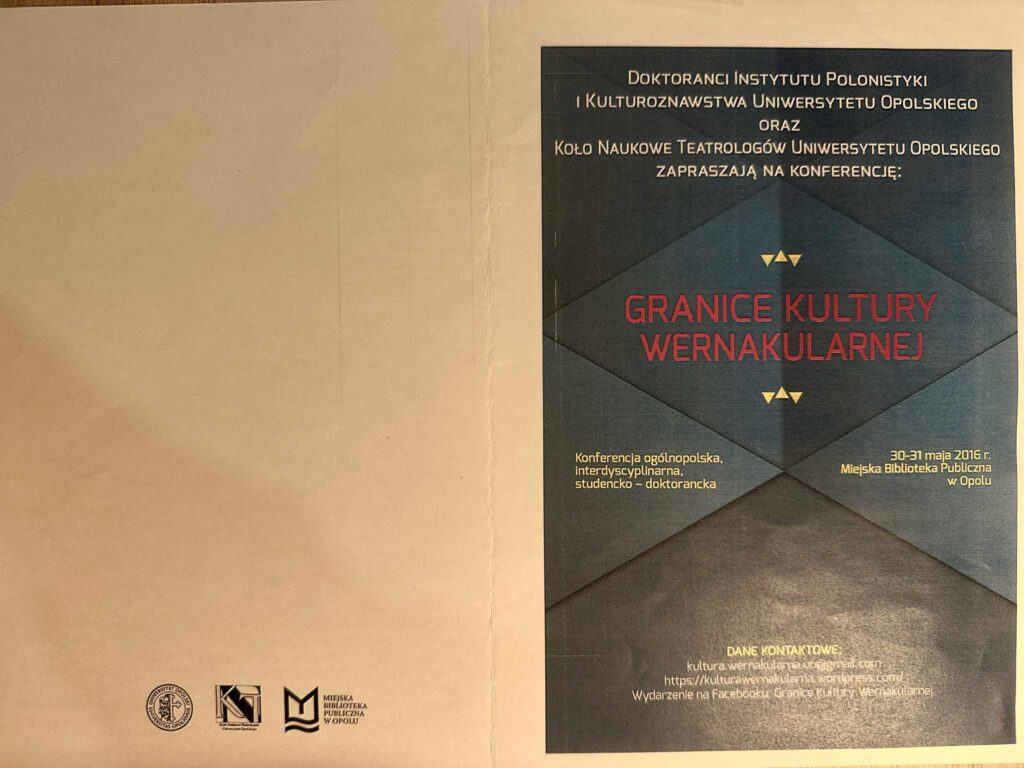

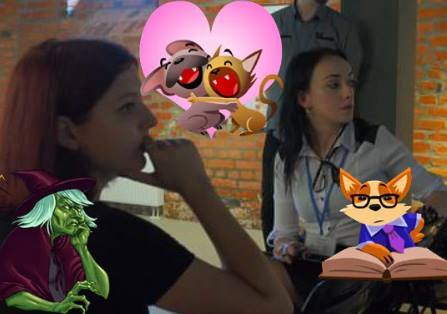
Piękne zdjęcia z naszej konferencji zrobił Szymon Wybraniec. Paulina Gowin przerobiła jedno z nich, co chyba najlepiej odzwierciedla nastroje „behind the scenes” organizacji wydarzeń naukowych przez nasz zespół. ; )
JURY DZIENNIKARZY OGÓLNOPOLSKIEGO FESTIWALU "KLASYKA ŻYWA" W RAMACH OPOLSKICH KONFRONTACJI TEATRALNYCH
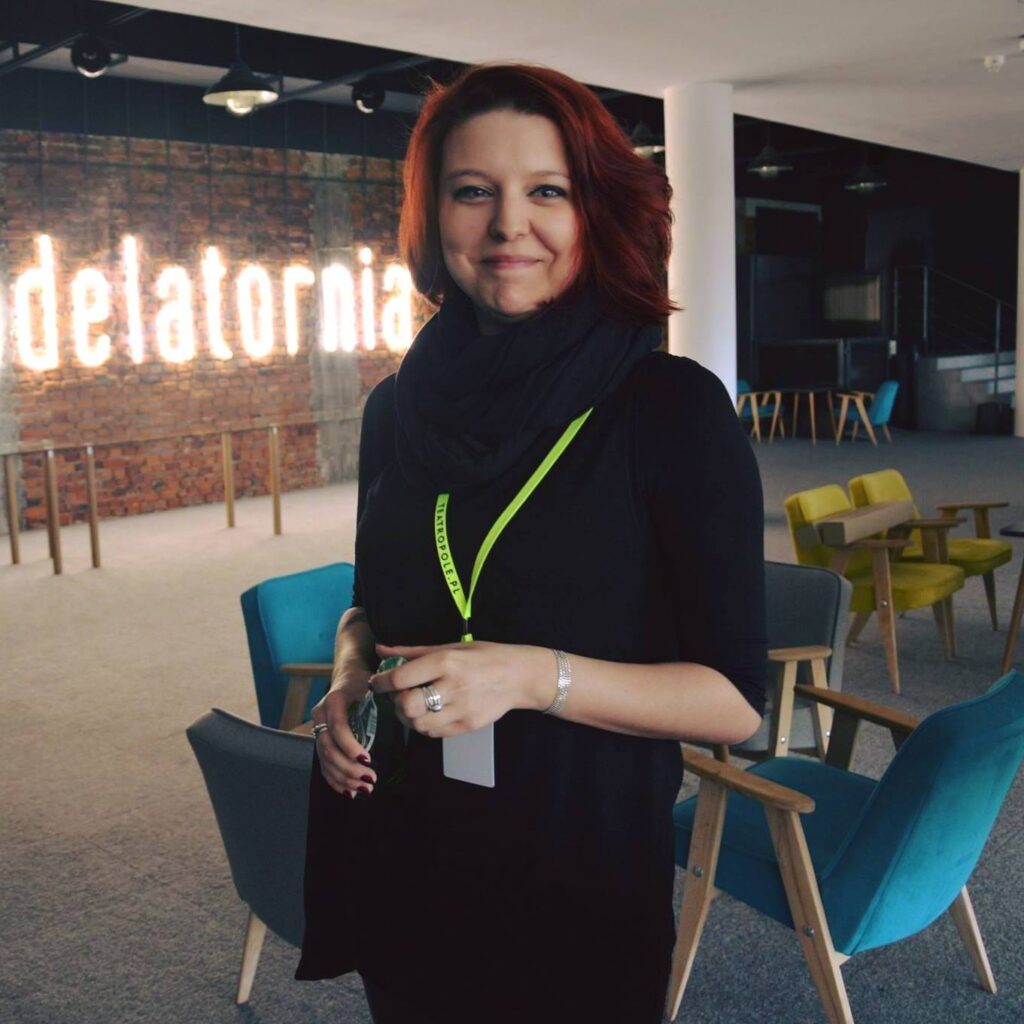
Podczas jednej z edycji Opolskich Konfrontacji Teatralnych zostałam zaproszona do pracy jako jurorka jednego z kilku składów oceniających spektakle z całej Polski.
Pamiętam, że byłam chora przez cały tydzień, miałam gorączkę i wychrypiałam do mikrofonu werdykt na największej scenie obrotowej w Europie. Takie wspomnienia zostają w pamięci. ; )
Zdjęcie zrobiła mi Katarzyna Majewska, recenzentka teatralna, kulturoznawczyni, a później również ekspertka marketingu i przedsiębiorczyni.
Miałam też wcześniej okazję podzielić się z nią swoją pracą jako rękodzielniczka, ponieważ Kasia opisywała mój dawny blog rękodzielniczy w swojej pracy magisterskiej. A kilka lat później zorganizowałam jej wieczór panieński. ; )
KONFERENCJE OGÓLNOPOLSKIE
Organizatorzy zapytali dzieci uczestniczące w warsztatach, jak wyobrażają sobie naukowców i poprosili je o ozdobienie naszych certyfikatów. Ja otrzymałam dokument z Einsteinem. ; )
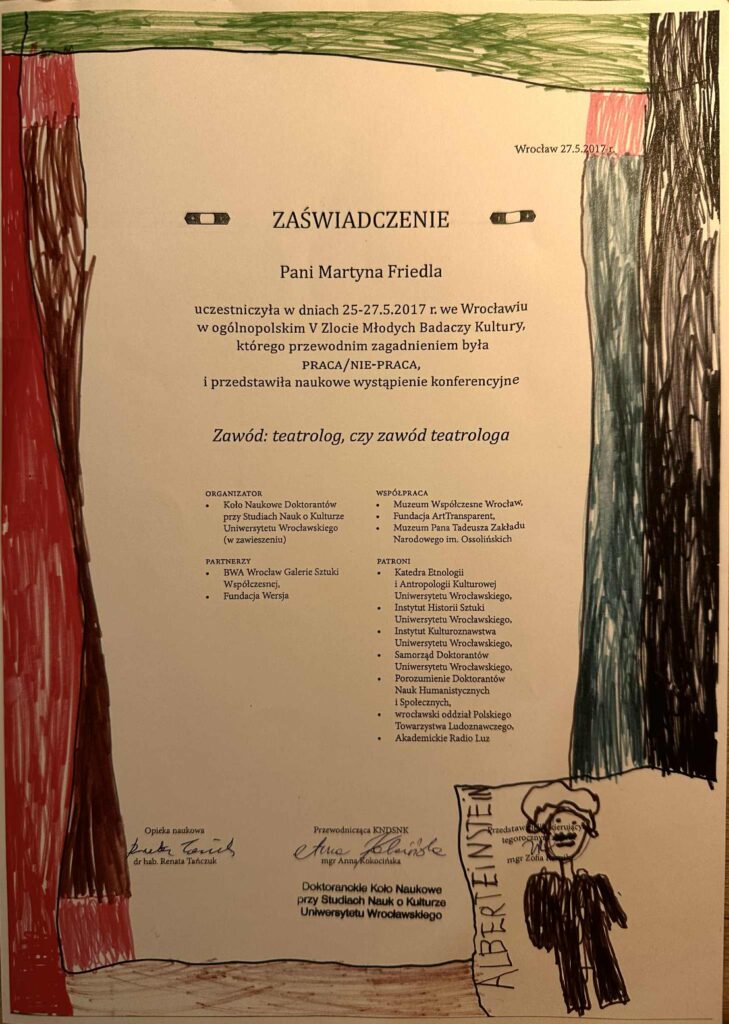
Certificate
„Ms. Martyna Friedla participated on May 25-27, 2017, in Wrocław, in the National V Gathering of Young Culture Researchers, with the main topic being “Work, Non-Work,” and she presented a conference paper titled “The Profession of a Theatre Scholar or the Profession of a Theatre Scholar?”

„Ms. Martyna Friedla presented a paper titled “The Response of Theatre Artists to Media Activities,” thereby actively participating in the national academic conference “Media of the 21st Century,” organized by the Association of Young Creators Kontrast, on November 5-6, 2015″.

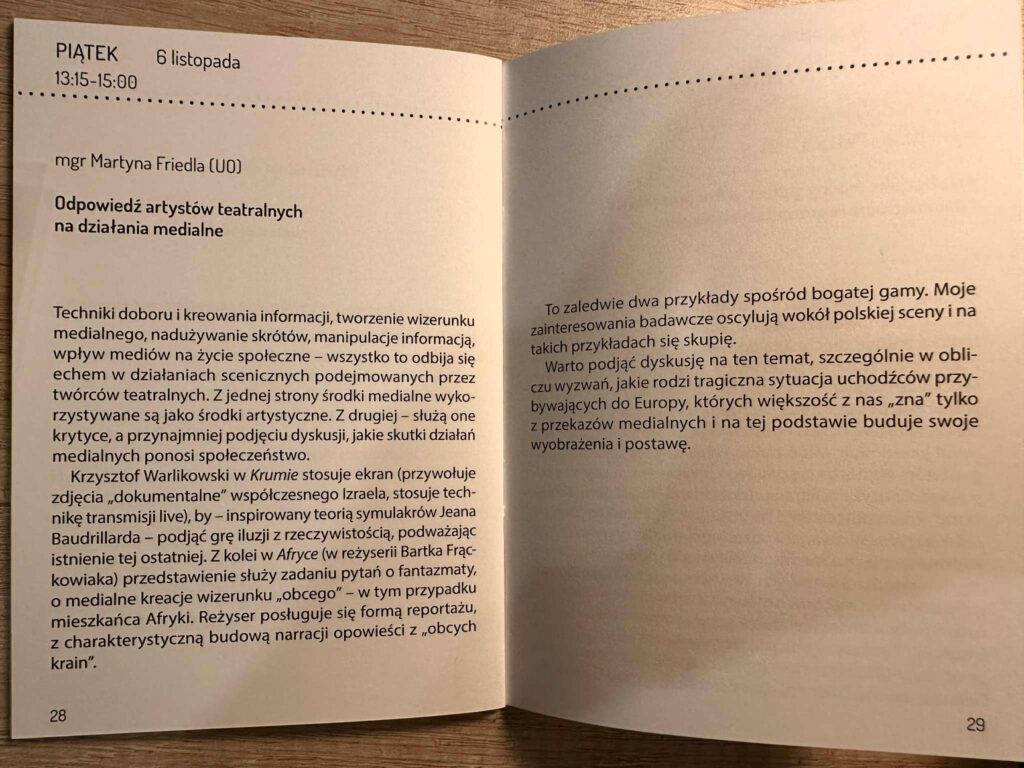
MY ABSTRACT
„The response of theatre artists to media activities, the techniques of selecting and crafting information, creating a media image, the overuse of abbreviations, information manipulation, and the impact of media on social life — all of this echoes in the stage actions undertaken by theatre creators. On one hand, media tools are used as artistic means; on the other, they serve as a critique, or at least as a starting point for a discussion on the societal consequences of media actions. In spectacle “Krum,” Krzysztof Warlikowski uses a screen, invokes documentary images of contemporary Israel, and employs live streaming techniques to engage with Baudrillard’s theory of the simulacrum, challenging the very existence of reality. Meanwhile, in “Africa,” directed by Bartosz Frąckowiak, the performance raises questions about the media-created phantom image of the “other,” in this case, the inhabitants of Africa. The director uses a reportage form with a distinctive narrative structure of stories from distant lands. These are just two examples from a rich spectrum, and my research interests focus on the Polish stage, so I will center on such examples. It is worth discussing this, especially in light of the challenges posed by the tragic refugee situation in Europe, which most of us „know” only through media coverage, shaping our perceptions and attitudes”.
OGÓLNOPOLSKI FESTIWAL TEATRÓW LALEK
ORGANIZACJA I WSPÓŁPROWADZENIE PANELU DYSKUSYJNEGO: "[PRZYWRÓCIĆ] MATERIALNOŚĆ W BADANIACH TEATRALNYCH"
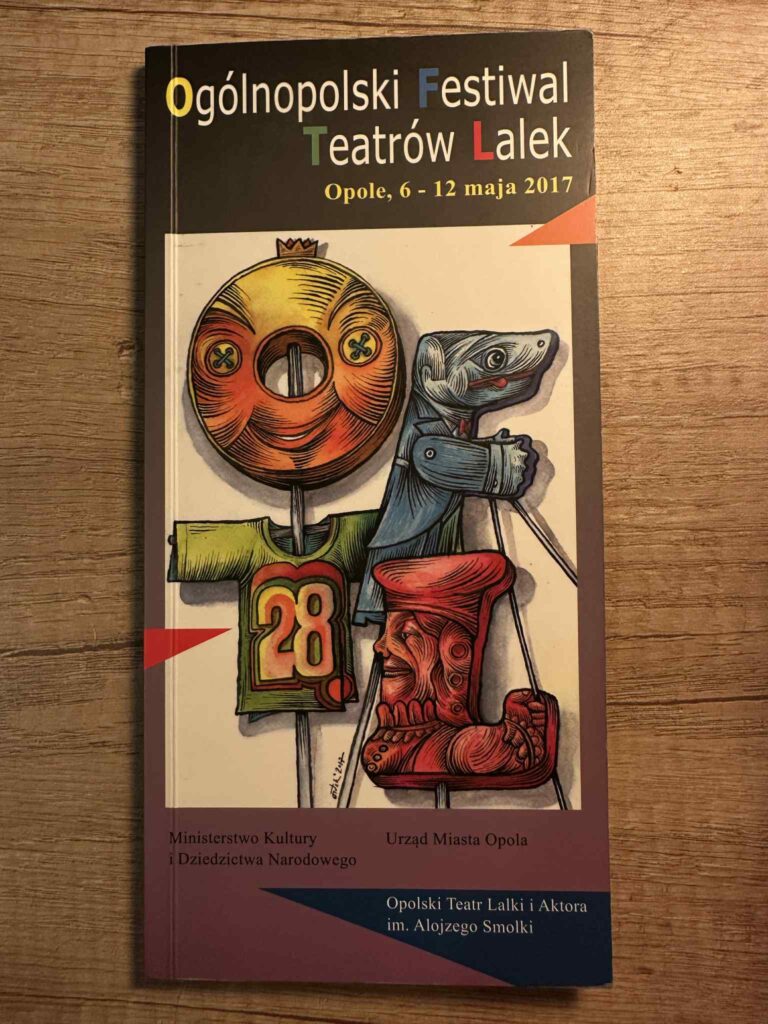
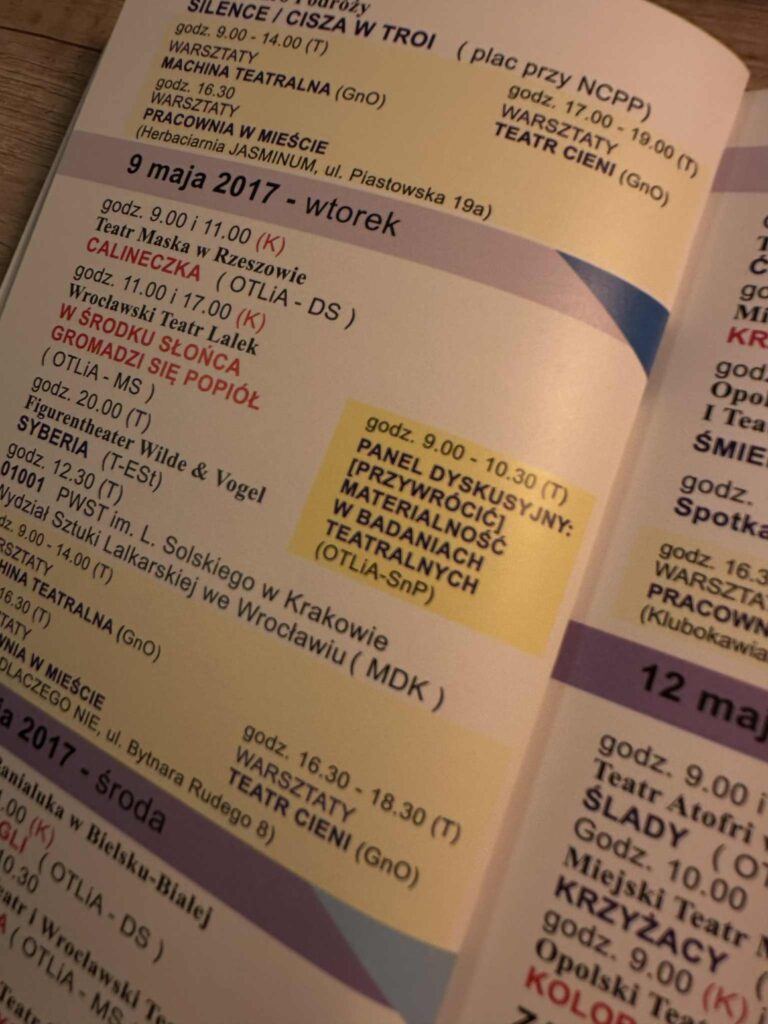
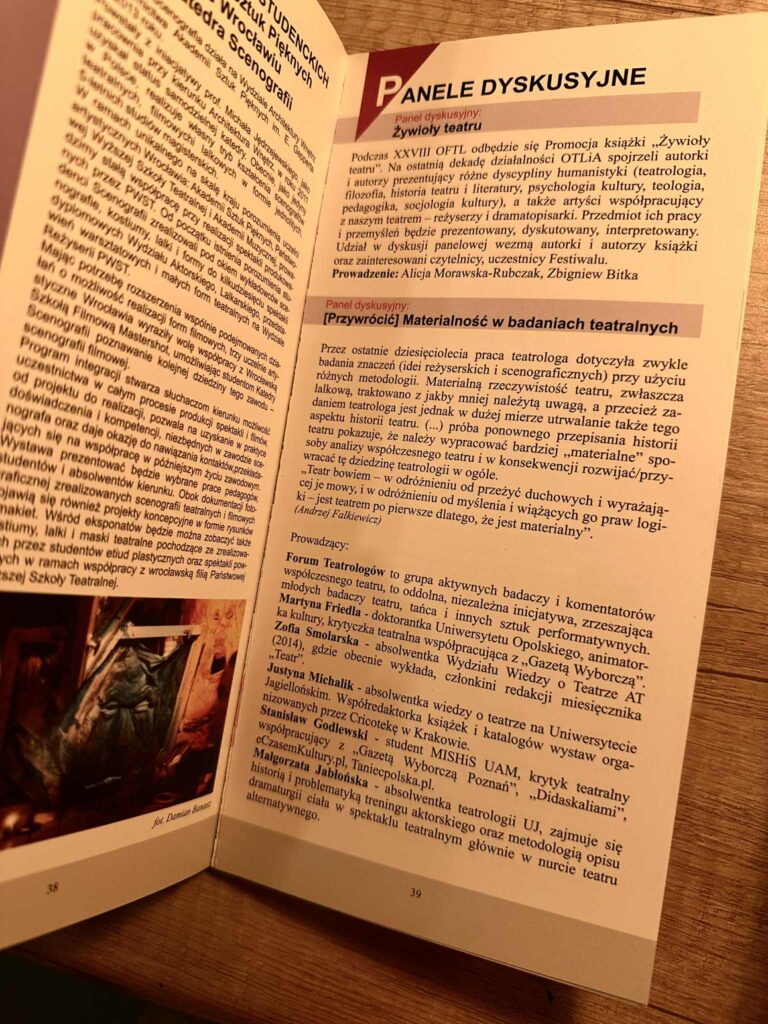
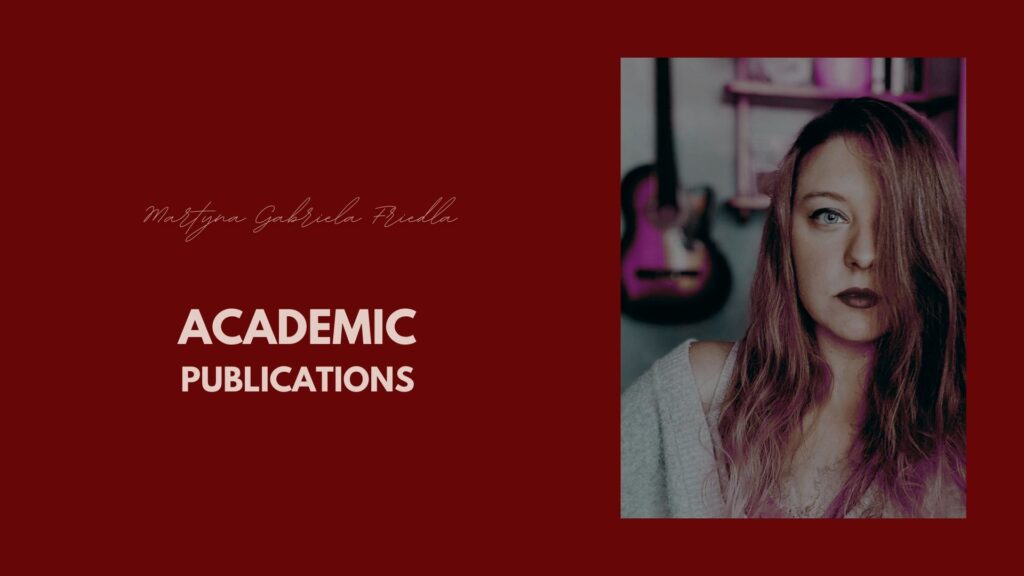
/ WYBRANE PUBLIKACJE AKADEMICKIE /
PUPPETRY IN THE 21st CENTURY: REFLECTIONS AND CHALLENGES
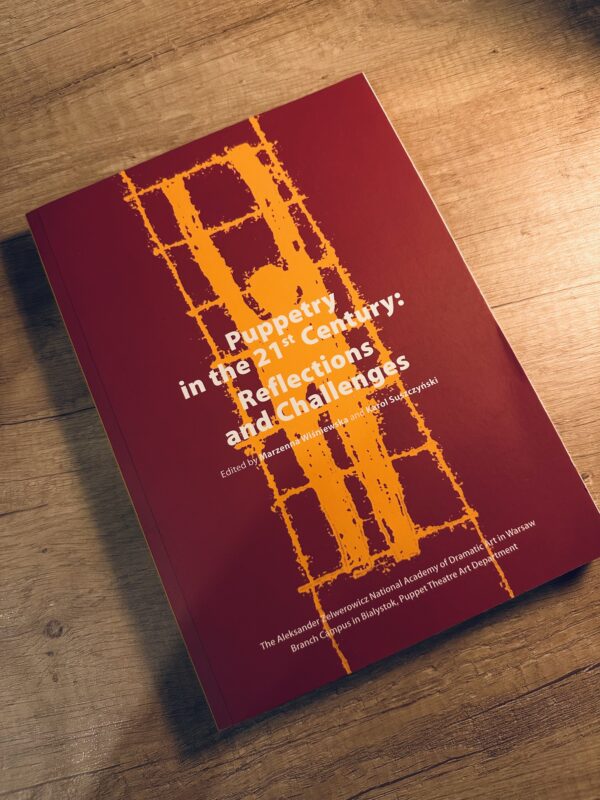
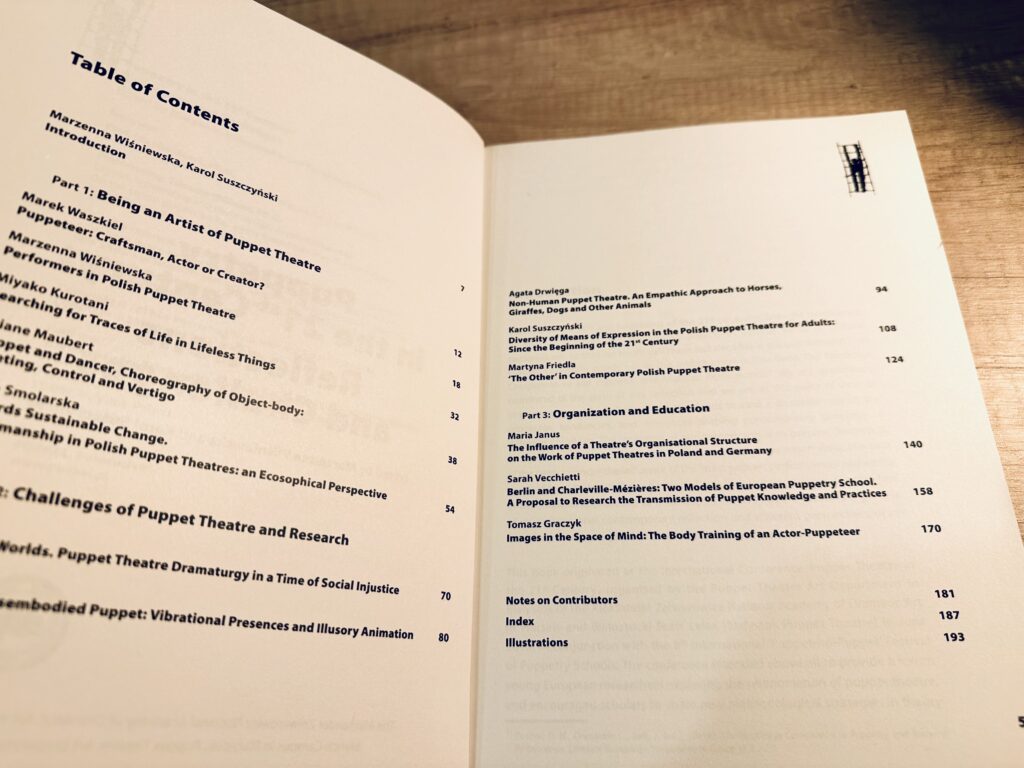

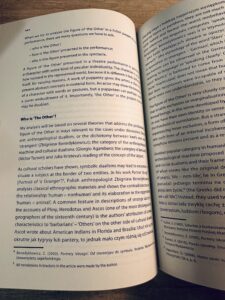

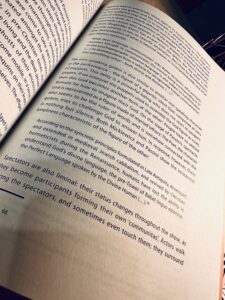
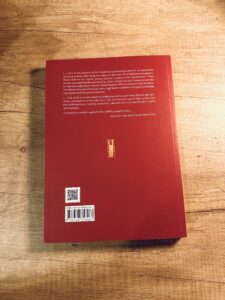
ŚWIAT KURIOZÓW. OD ZADZIWIENIA DO FASCYNACJI

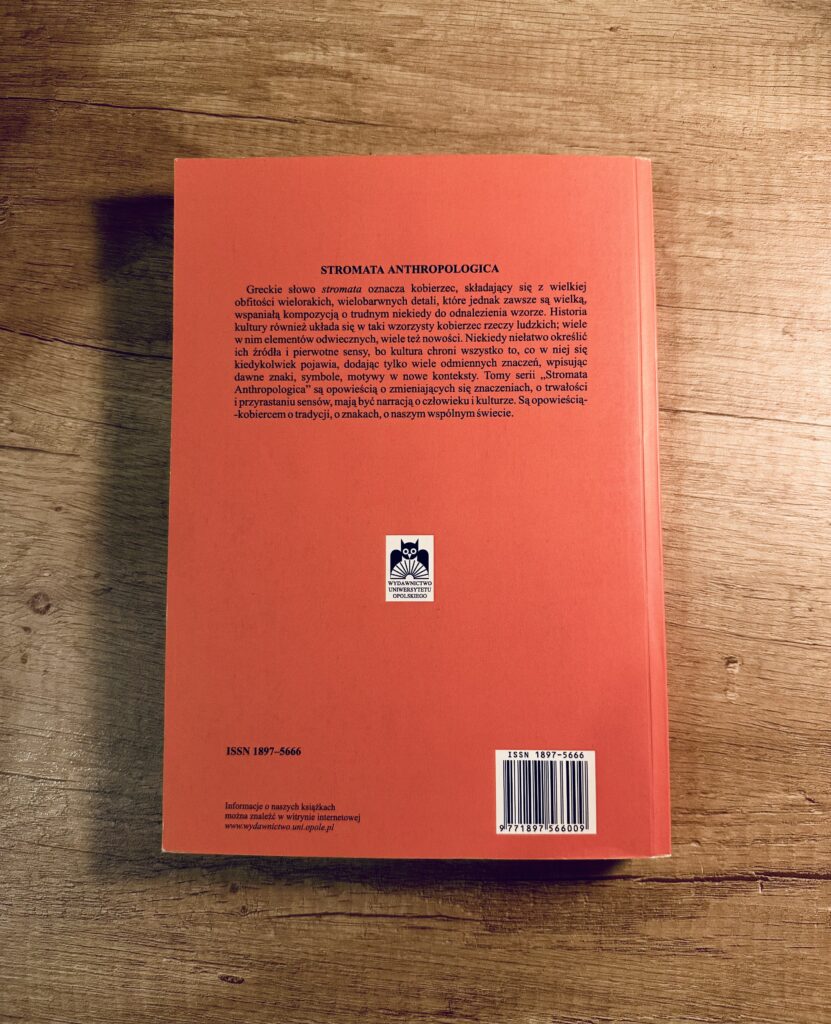

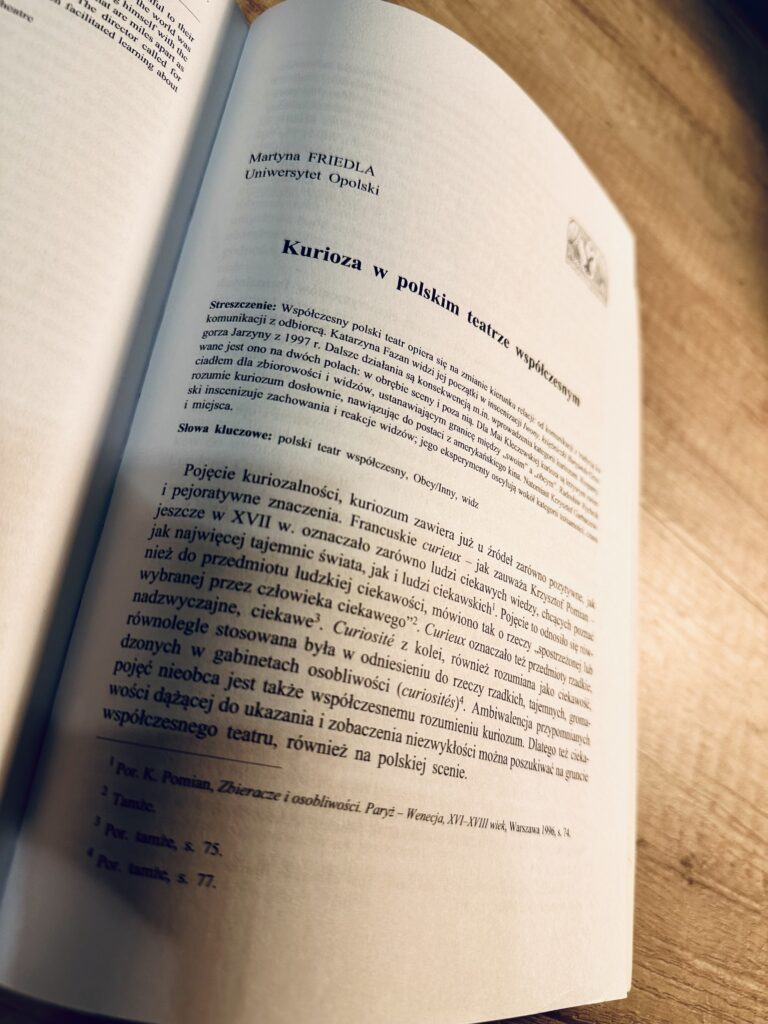
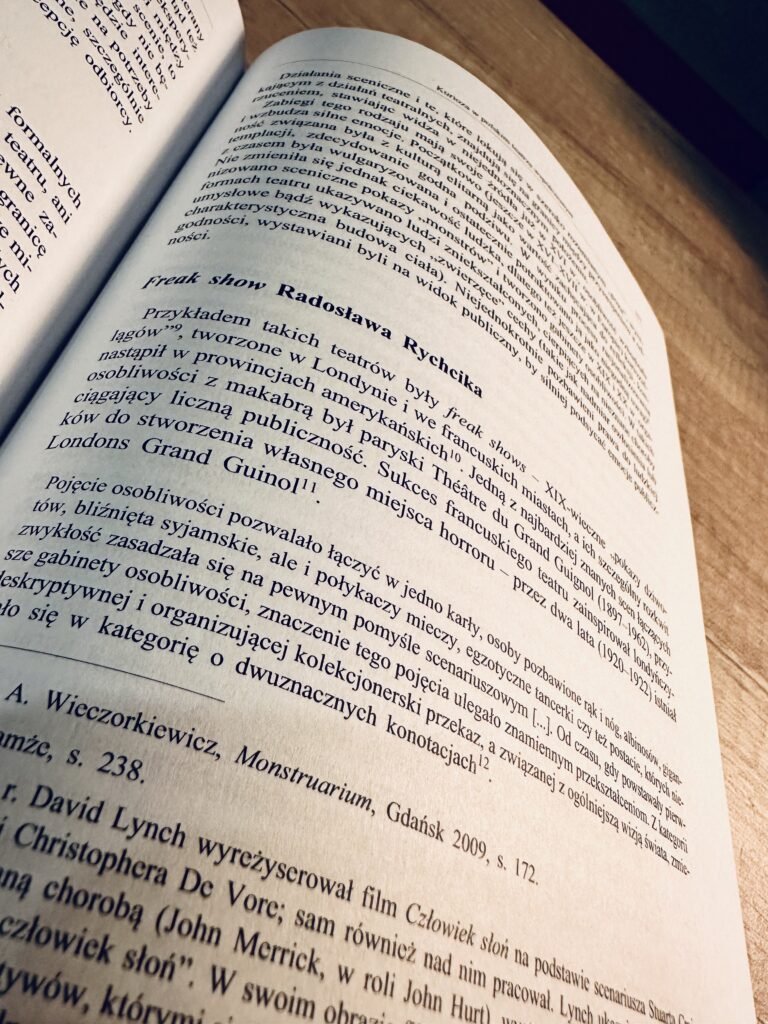
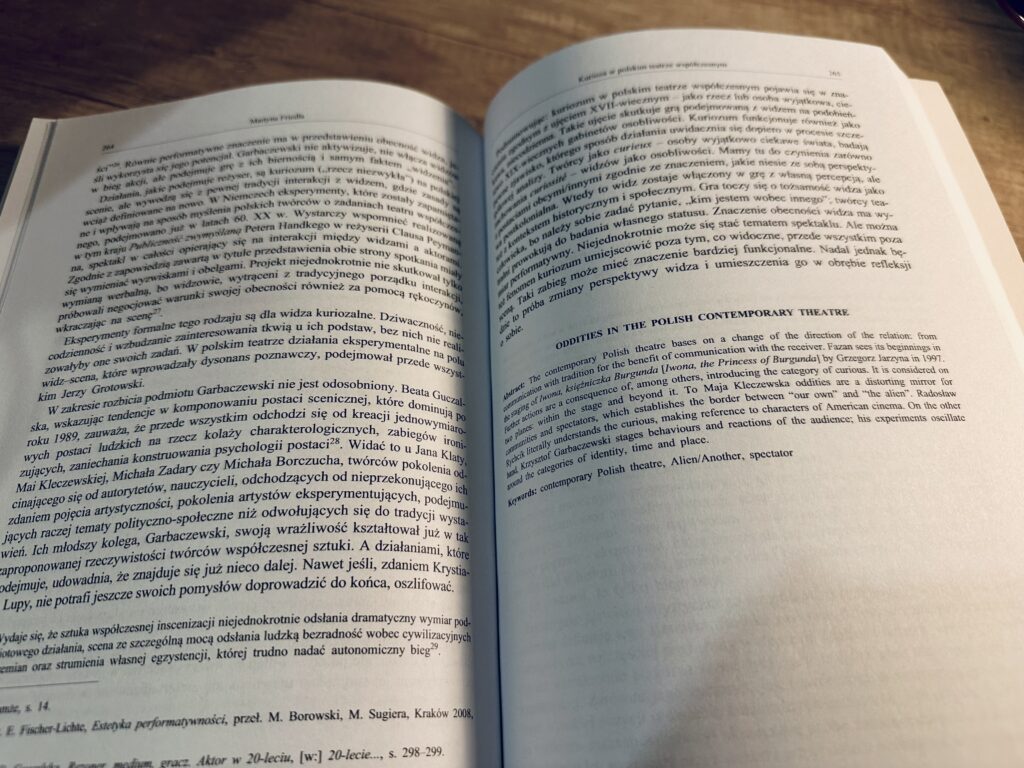
Quote from the cover:
„STROMATA ANTHROPOLOGICA
The Greek word “stromata” means a kind of tapestry composed of a vast abundance of diverse, colorful details, which, however, always form a magnificent composition with patterns that can sometimes be hard to discern. The history of culture also unfolds in such a patterned tapestry of human affairs, with many eternal elements and also many novelties. Sometimes it’s not easy to trace their origins and original meanings, because culture preserves everything that ever appears in it, adding numerous different meanings and placing old signs, symbols, and motifs into new contexts. The volumes of the “Stromata Anthropologica” series are narratives about shifting meanings, about the durability and growth of meanings, and they are meant to be a story about humans and culture, a story about this tapestry, about tradition, about signs, and about our shared world”.
KOLEKTYWY TEATRALNE, ARTYSTYCZNE I BADAWCZE
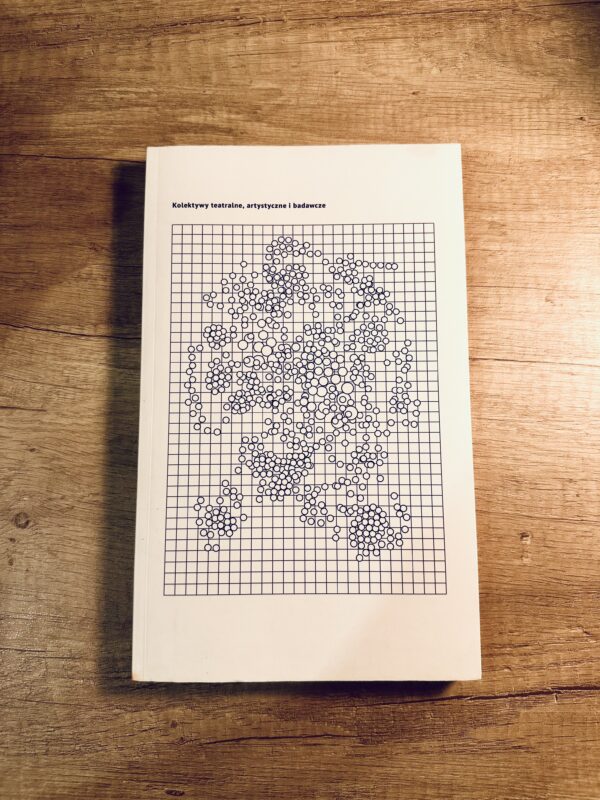


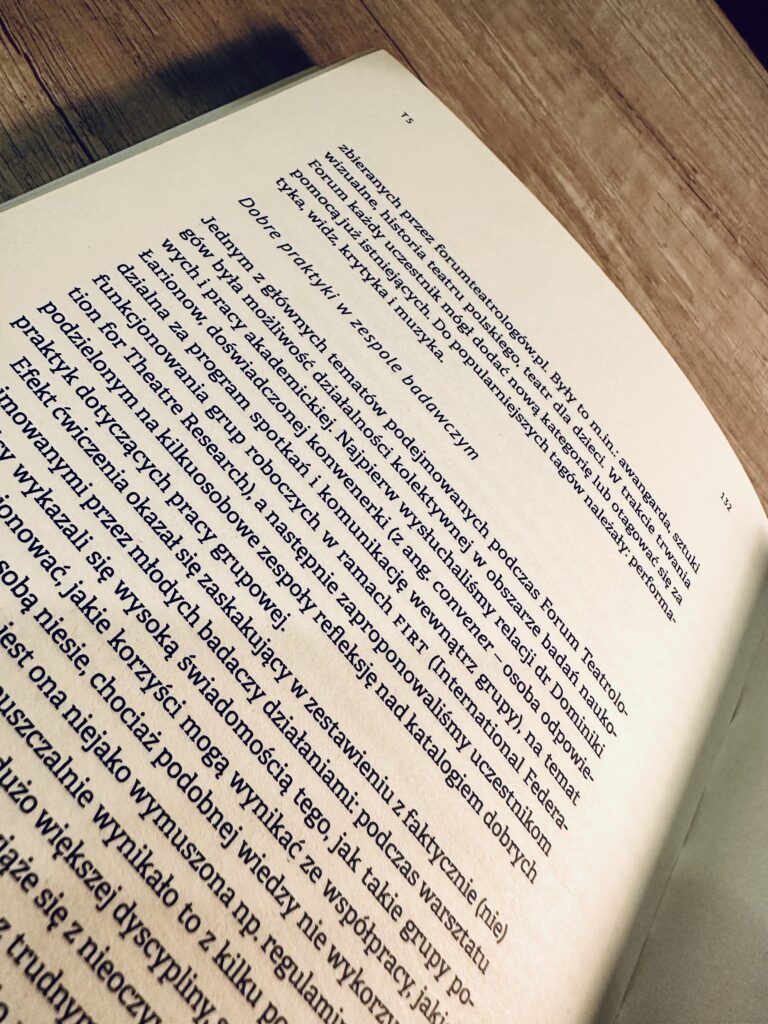
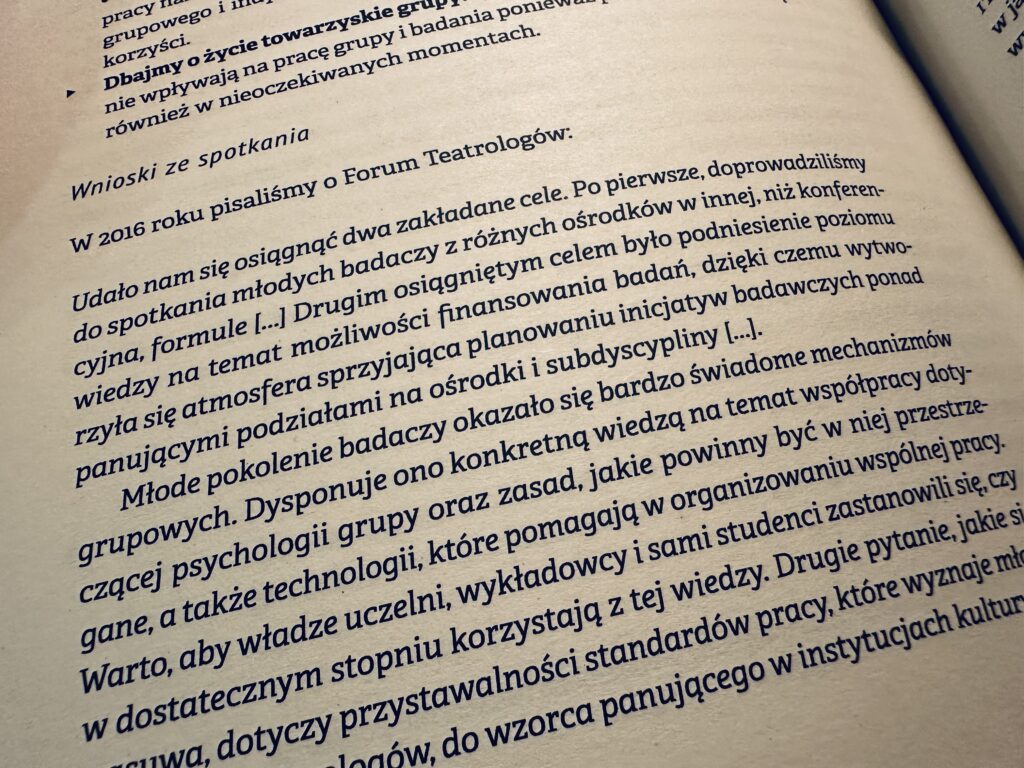
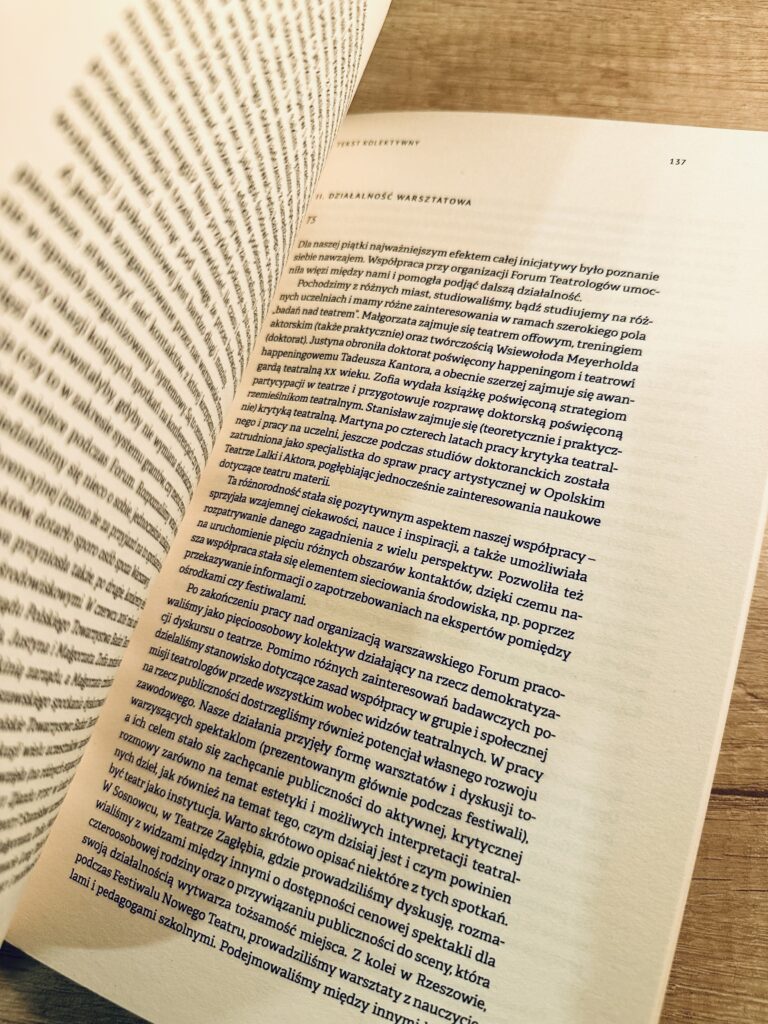
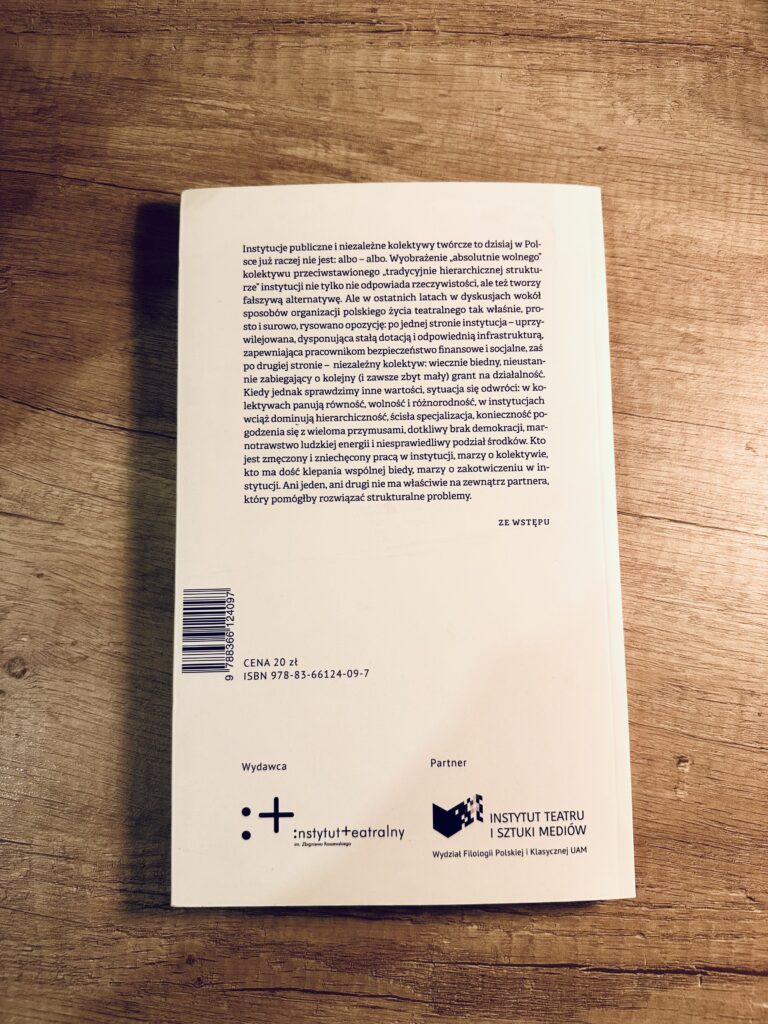
ON THE COVER:
„From an introduction: Public institutions and independent creative collectives in Poland today are no longer a matter of either-or. The idea of an absolutely free collective contrasted with a traditionally hierarchical institutional structure not only fails to reflect reality but also creates a false alternative. However, in recent debates about the organization of the Polish theater scene, this opposition has been drawn quite simply and starkly: on one side, the institution, privileged, with a stable subsidy and proper infrastructure, providing financial and social security for its employees; on the other side, the independent collective, perpetually poor, constantly scrambling for another grant that’s always too small. Yet, if we examine other values, the situation reverses: in collectives, there is equality, freedom, and diversity; in institutions, hierarchy, specialization, the need to reconcile with many constraints, a painful lack of democracy, waste of human energy, and unfair distribution of resources prevail. Those who are tired and disheartened by institutional work dream of a collective; those who are fed up with the shared poverty dream of anchoring in an institution. Neither has an external partner to help solve their structural problems”.
KWARTALNIK OPOLSKI
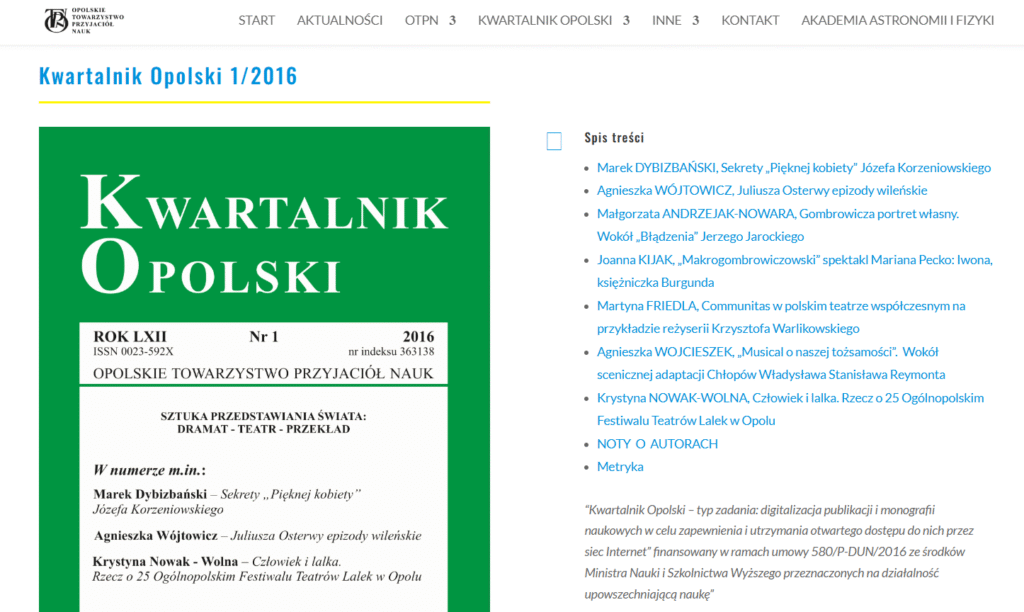

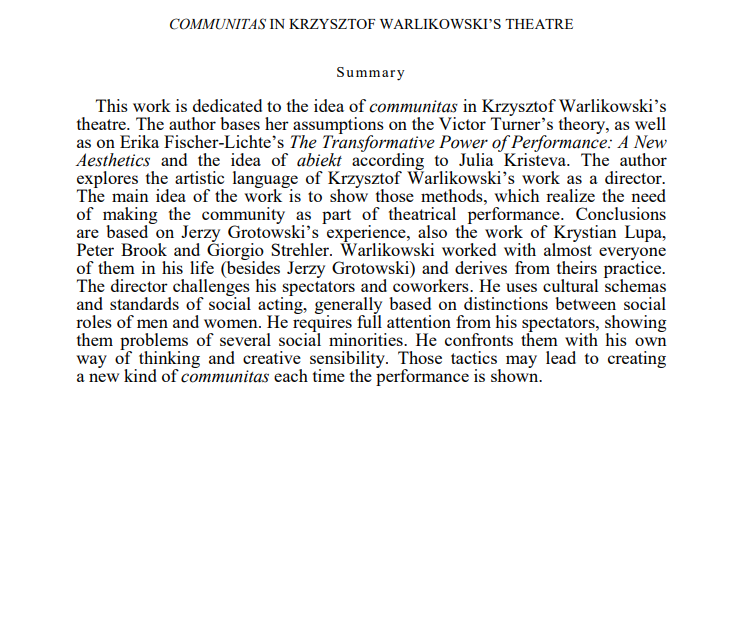
CZASOPISMO DLA NAUCZYCIELI I PEDAGOGÓW "MODELOWE NAUCZANIE"
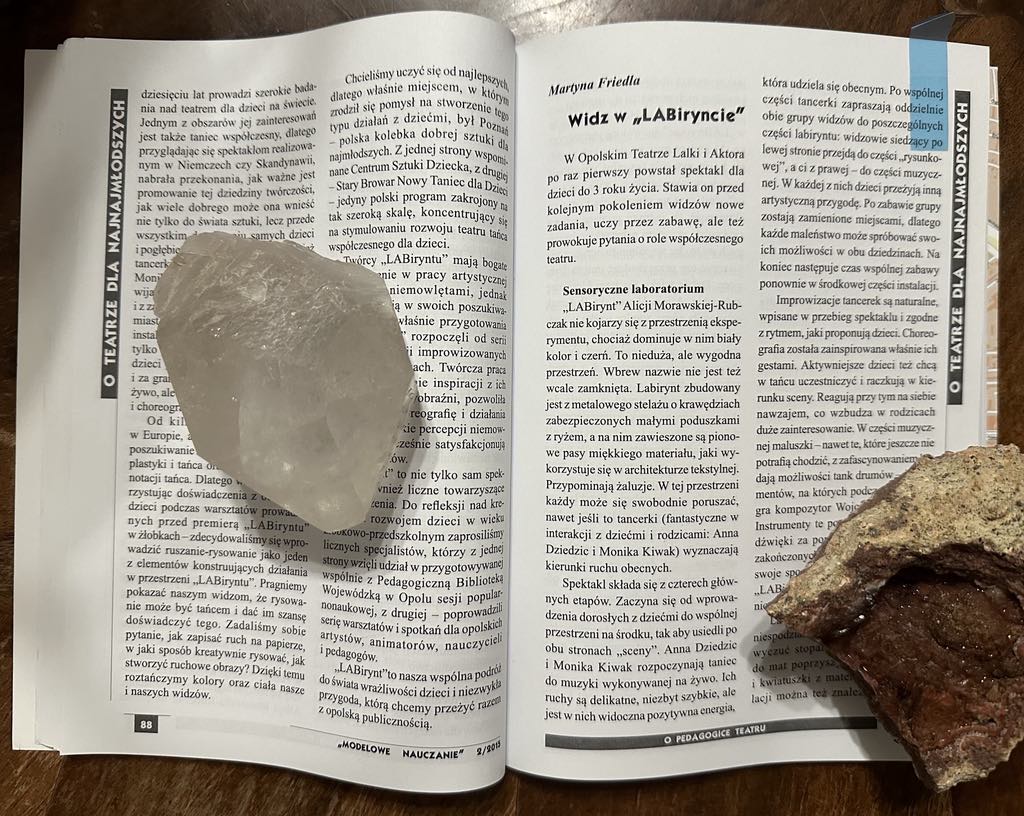
Mój artykuł na temat spektaklu „LABirynt” dla widzów najmłodszych, czyli do lat 3, zrealizowanego przez reżyserkę i pedagożkę teatru Alicję Morawską-Rubczak, przybliżający nauczycielom specyfikę teatru dla widzów, którzy inaczej doświadczają teatru niż często widzowie starsi, szczególnie ci, którzy nie mieli wczesnych doświadczeń ze sztuką teatru.
Wprowadzenie teatru dla najmłodszych, a później również upowszechnienie pedagogiki teatru i stworzenie odpowiedniego kierunku studiów w Polsce, pozwoliło otworzyć drzwi dla odbiorców, którzy w późniejszych latach czuli się w teatrze najswobodniej, mając szerokie pole recepcji i interpretacji sztuki, będąc oswojeni z aktorami, instrumentami muzycznymi, scenografią i czujący się jak współtwórcy wydarzenia artystycznego.
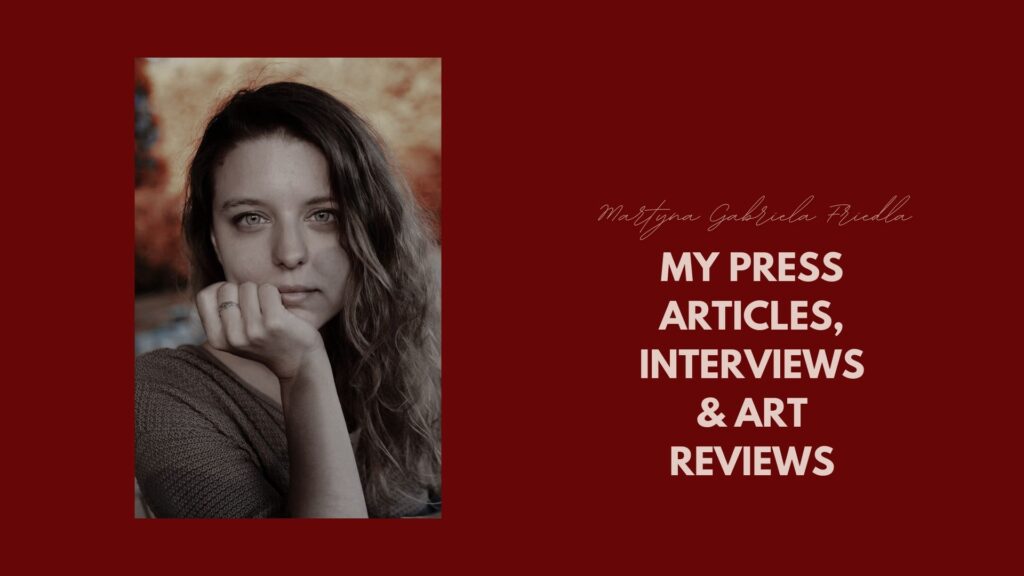
/ WYBRANE ARTYKUŁY PRASOWE, WYWIADY I RECENZJE MOJEGO AUTORSTWA /
PISMO TEATR
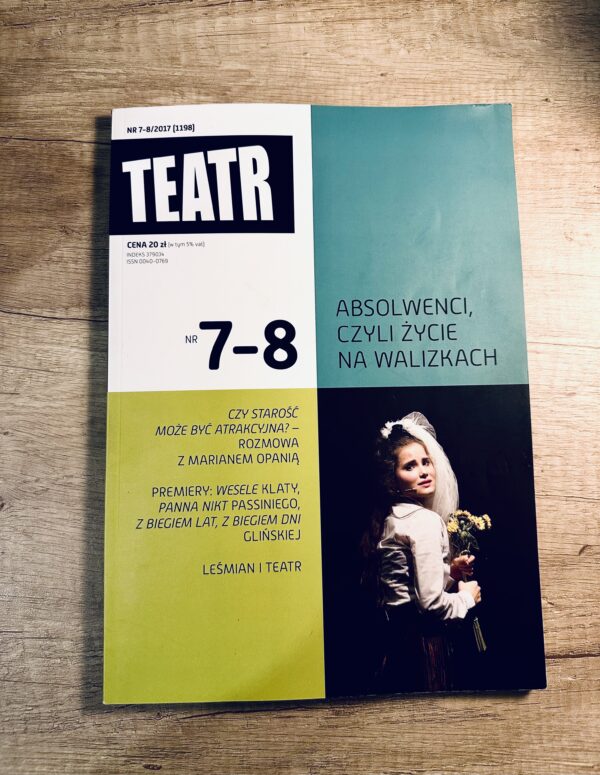
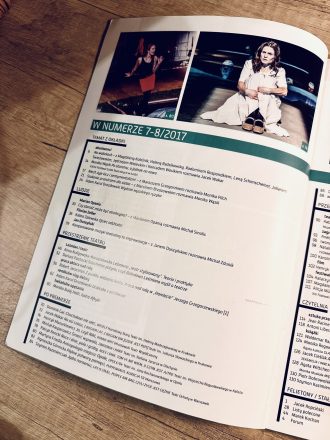

NOTATNIK TEATRALNY
Numer Notatnika Teatralnego poświęcony twórczości Krzysztofa Garbaczewskiego
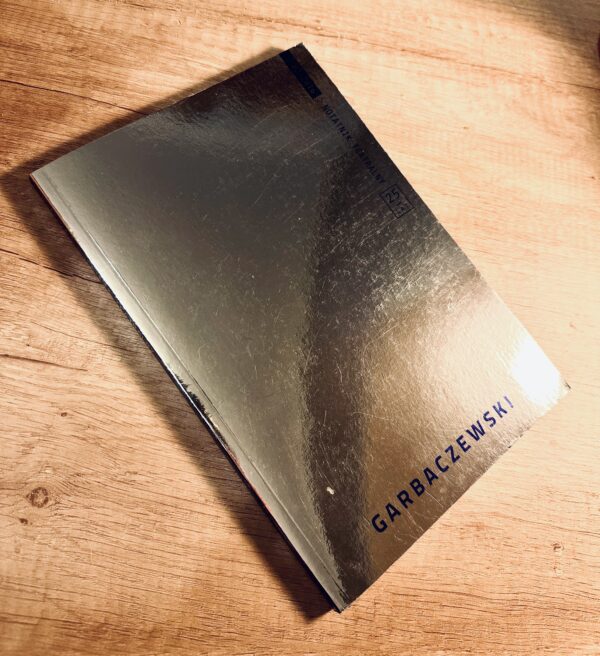
Wywiad, który przeprowadziłam z aktorką Zofią Bielewicz
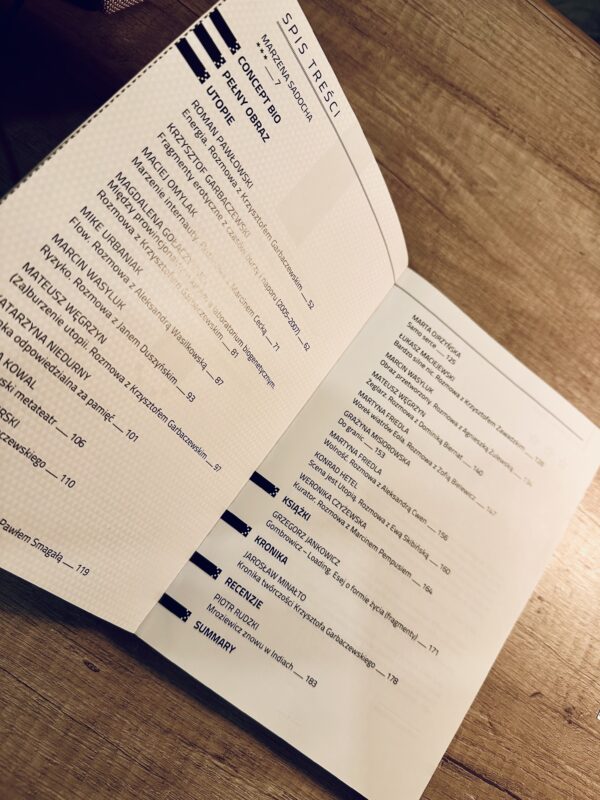
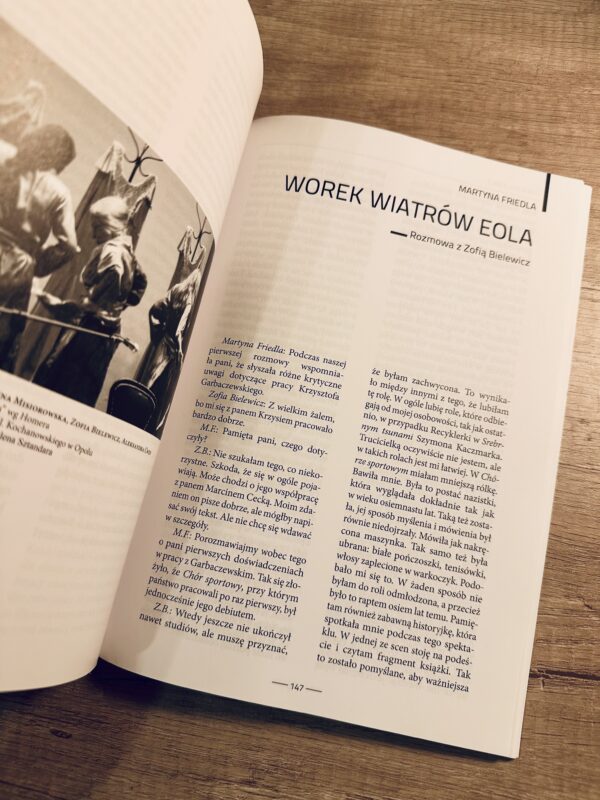
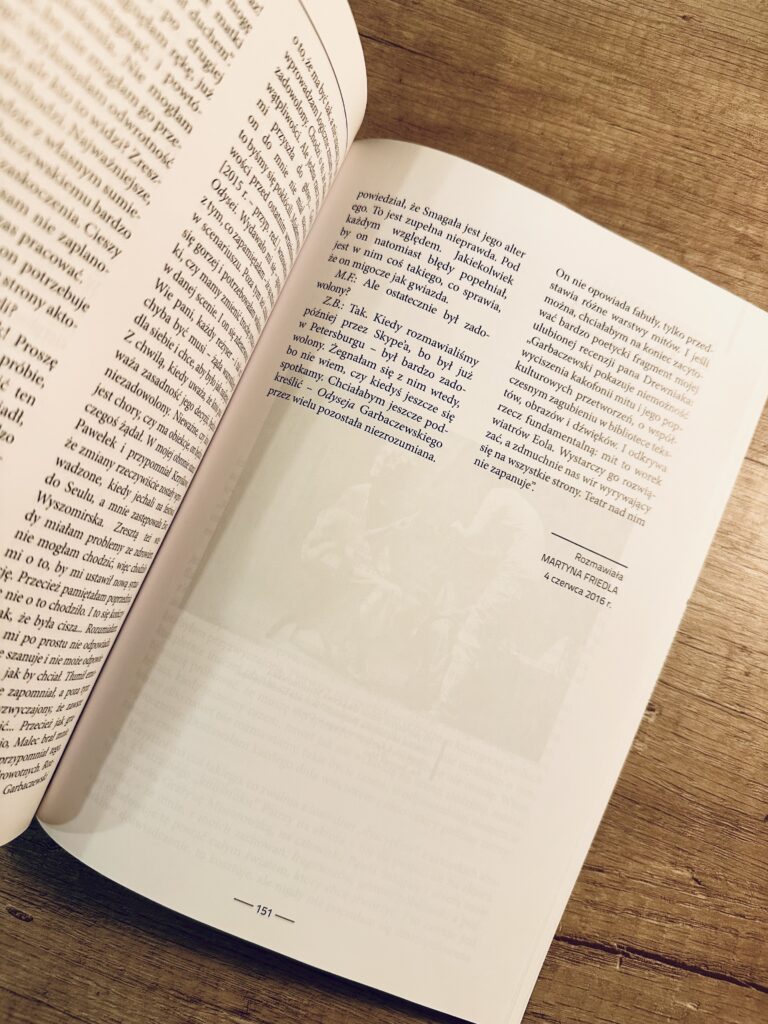
Wywiad, który przeprowadziłam z aktorką Aleksandrą Cwen

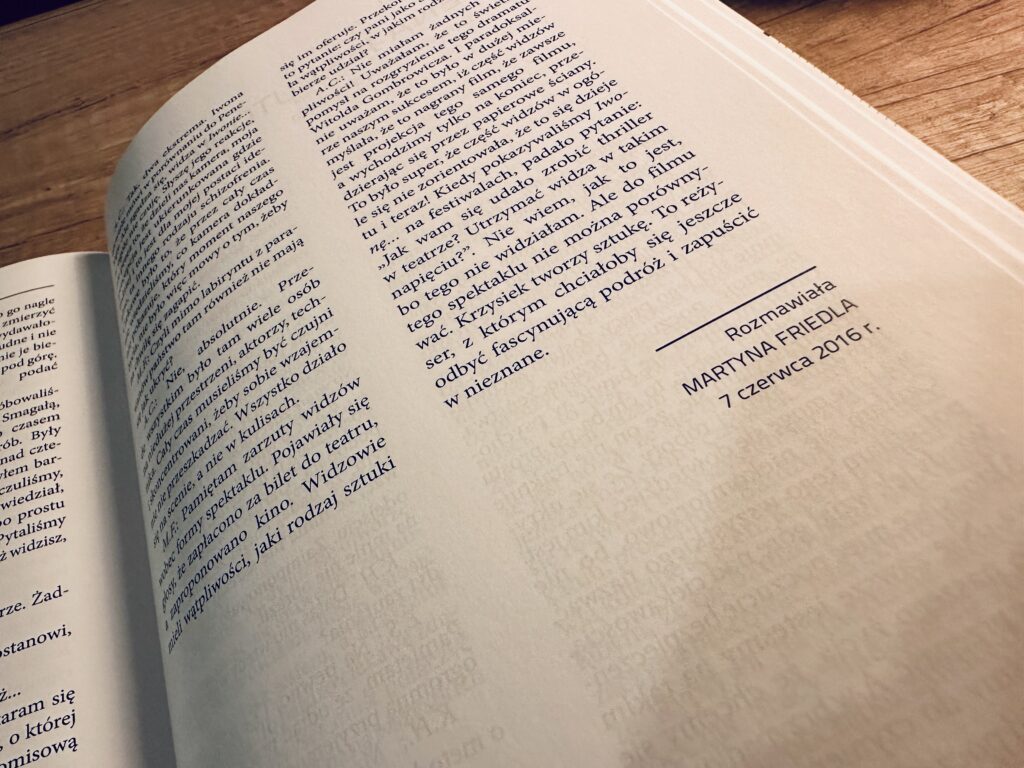
GAZETA WYBORCZA
[wybrane spośród kilkuset tekstów, które napisałam dla gazety]
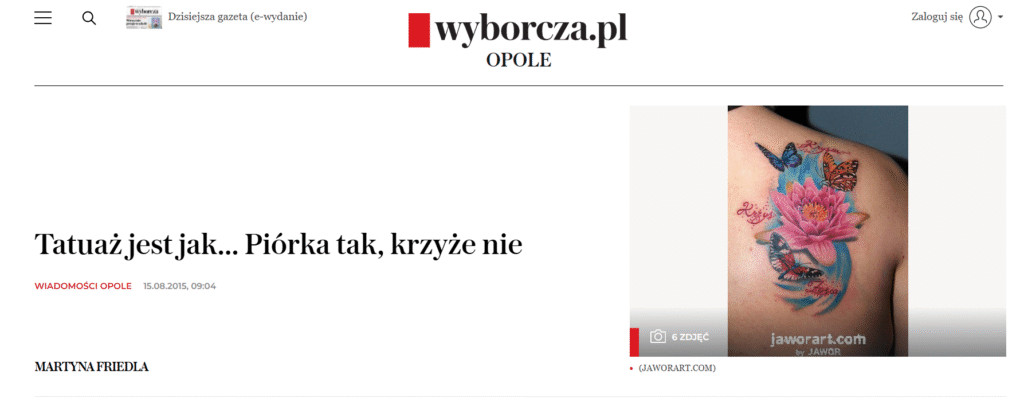

PISMO O TEATRZE FIKA
Wywiady i recenzje spektakli z Opolskiego Teatru Lalki i Aktora i Wrocławskiego Teatru Lalek
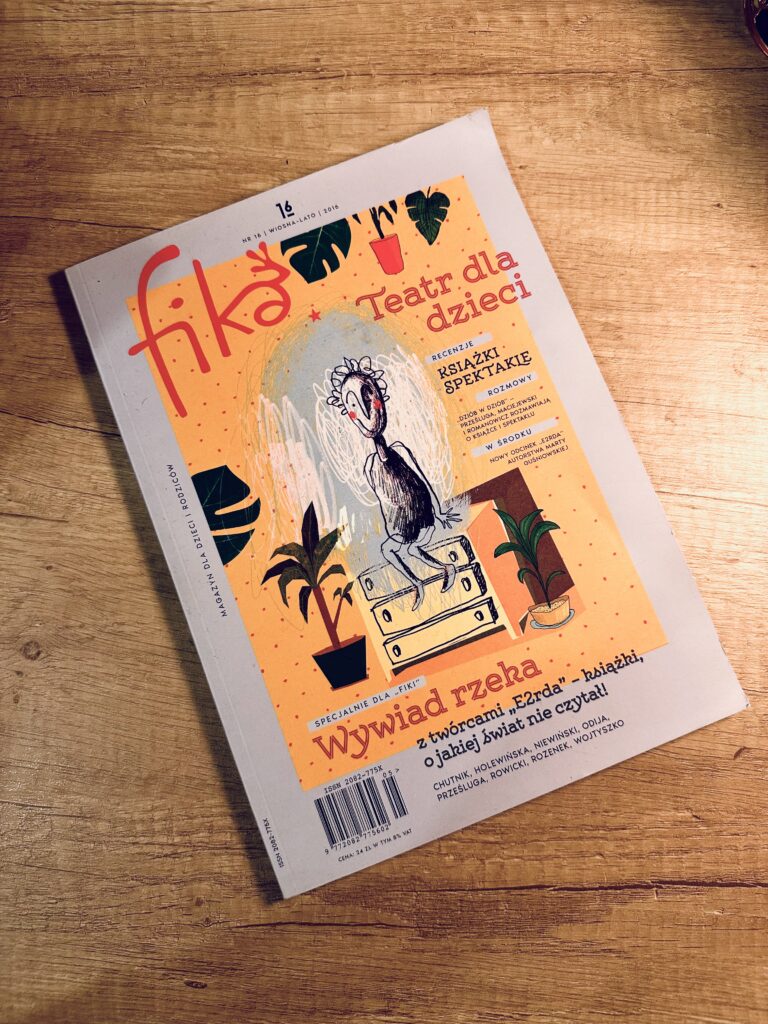
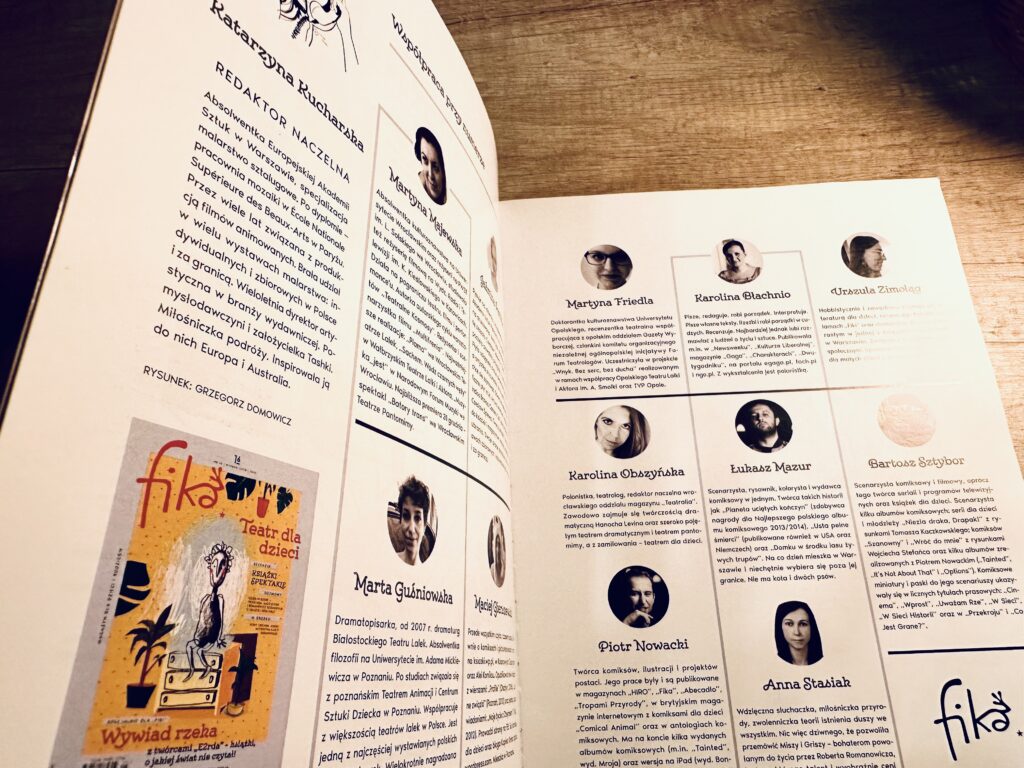
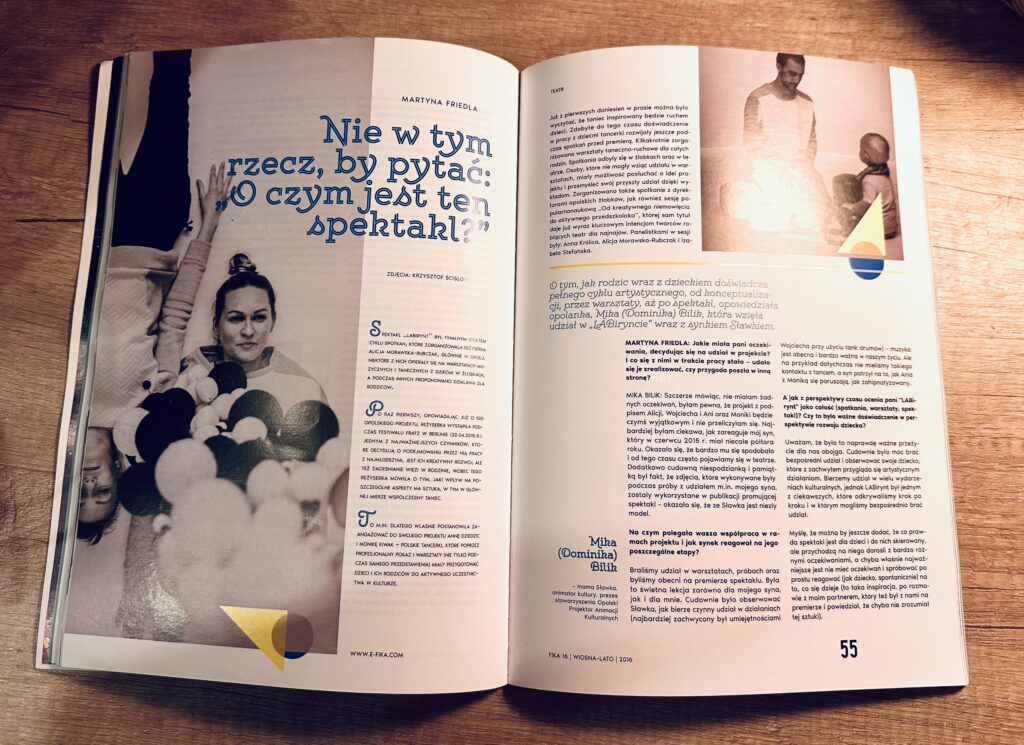
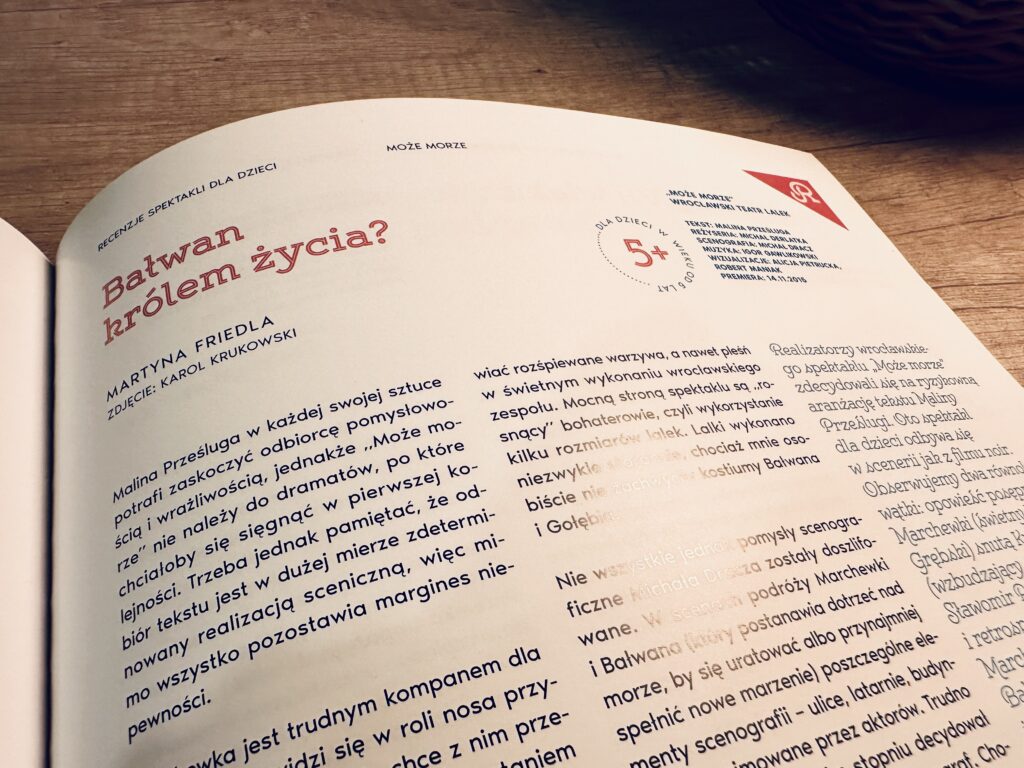
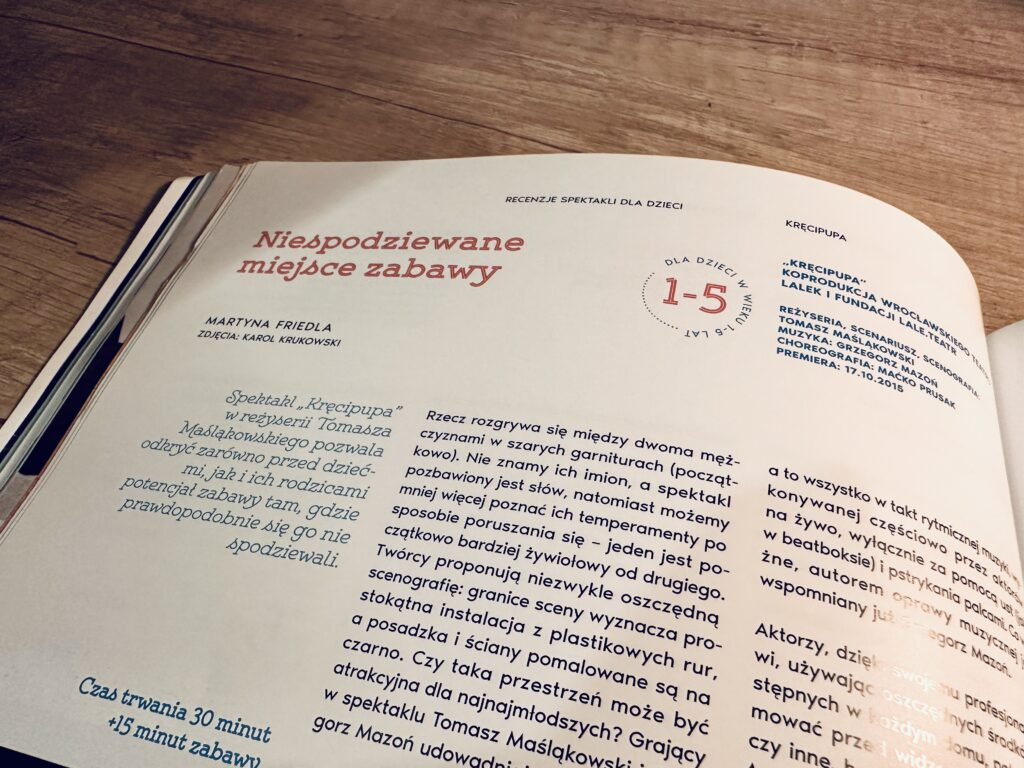
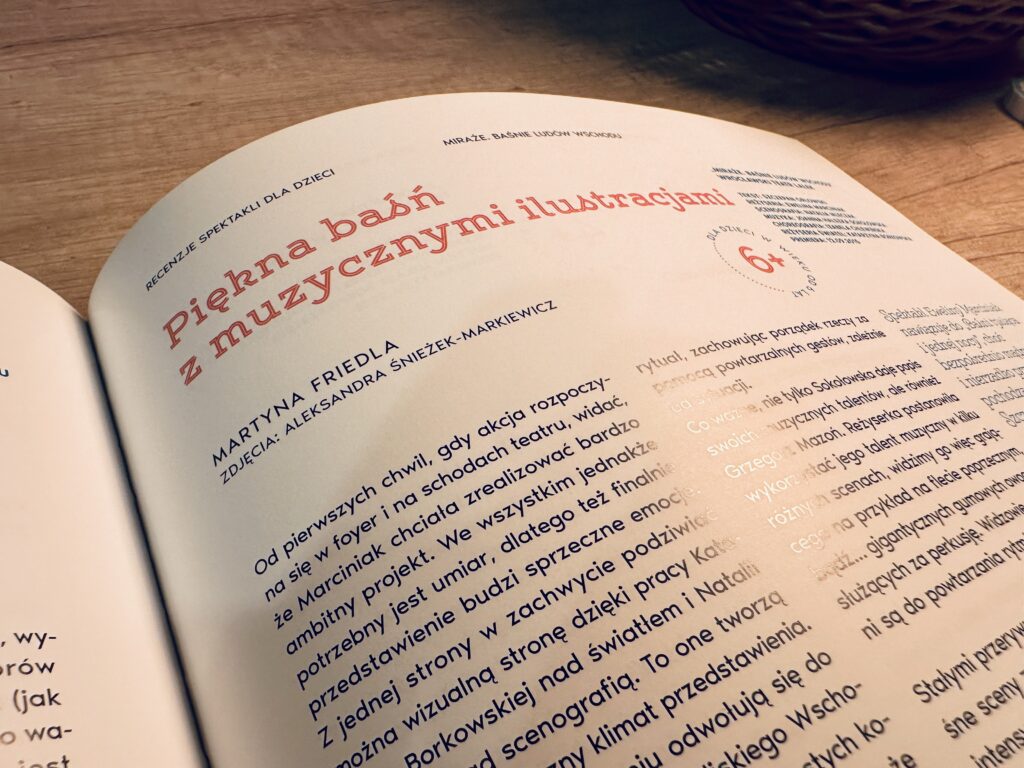
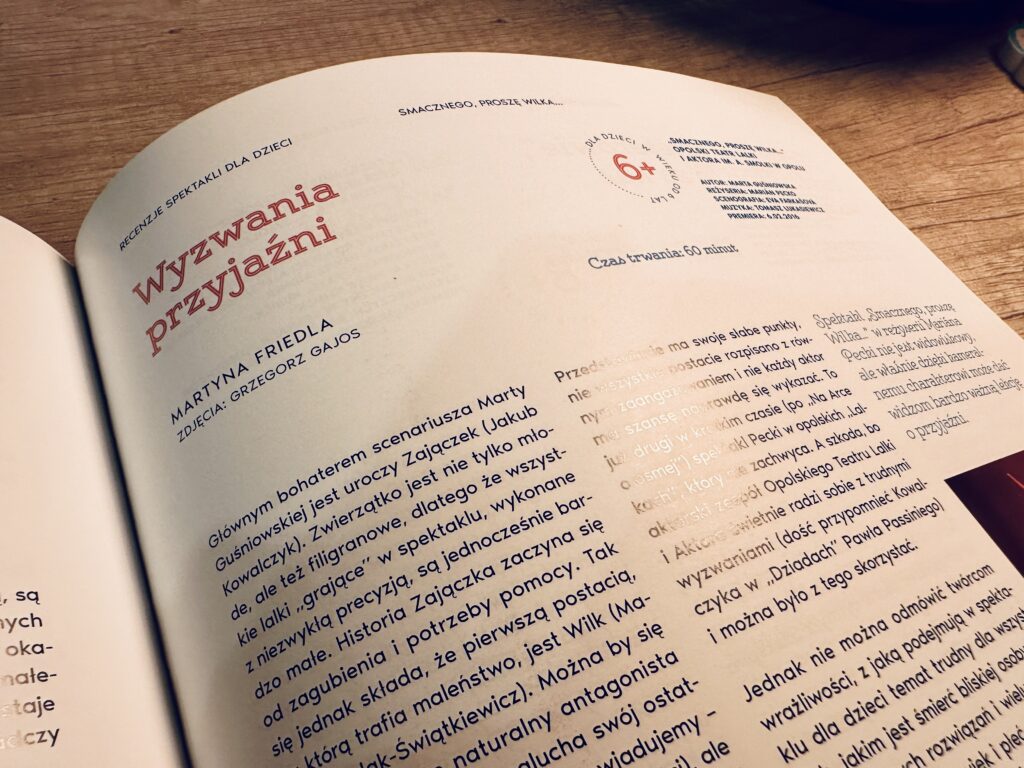
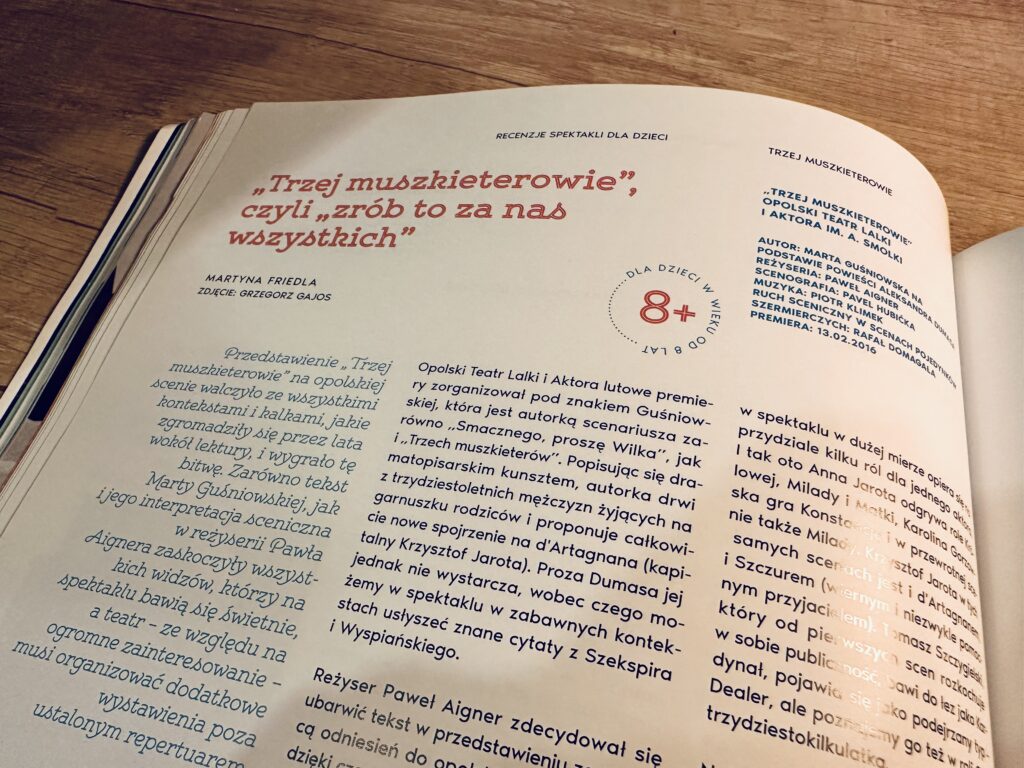
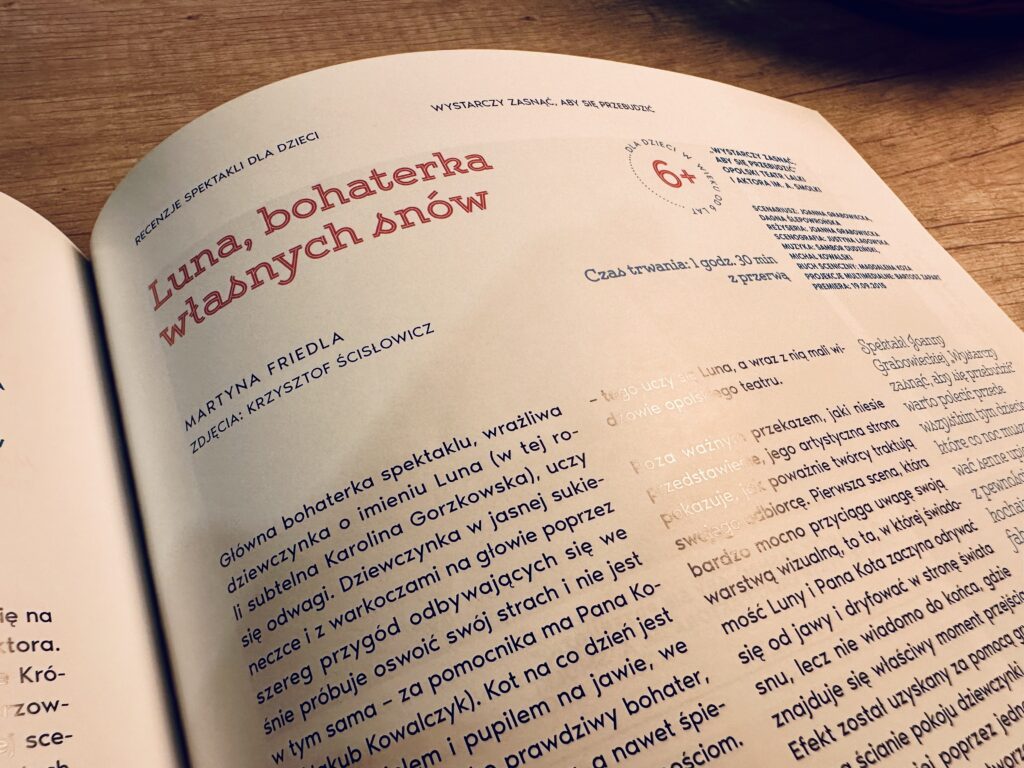
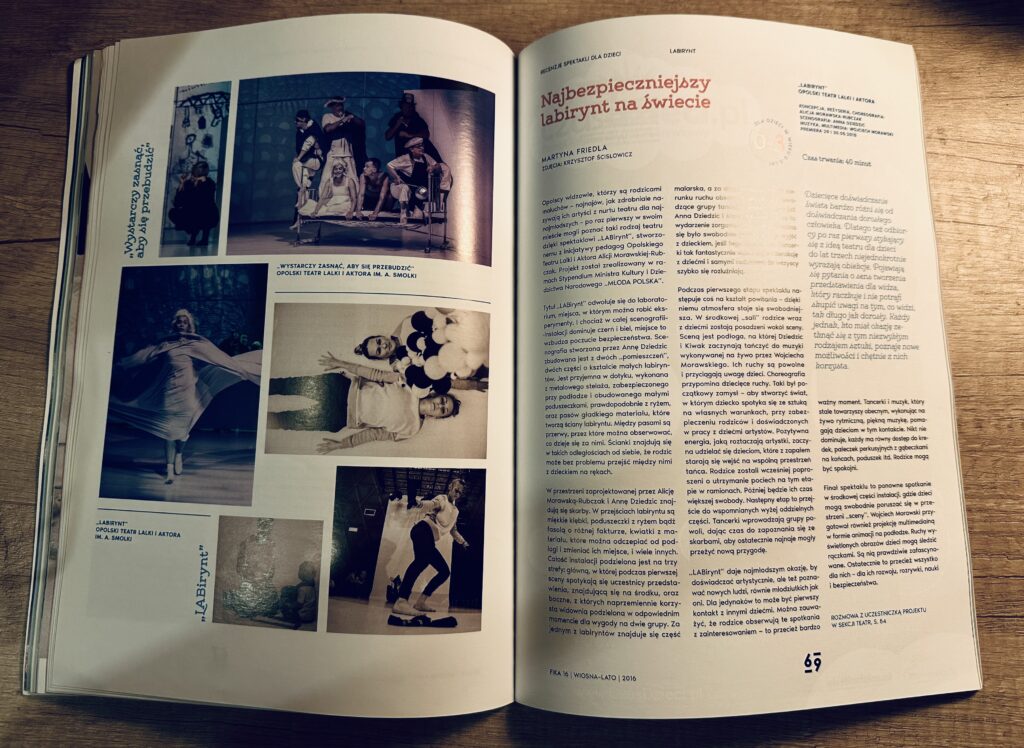
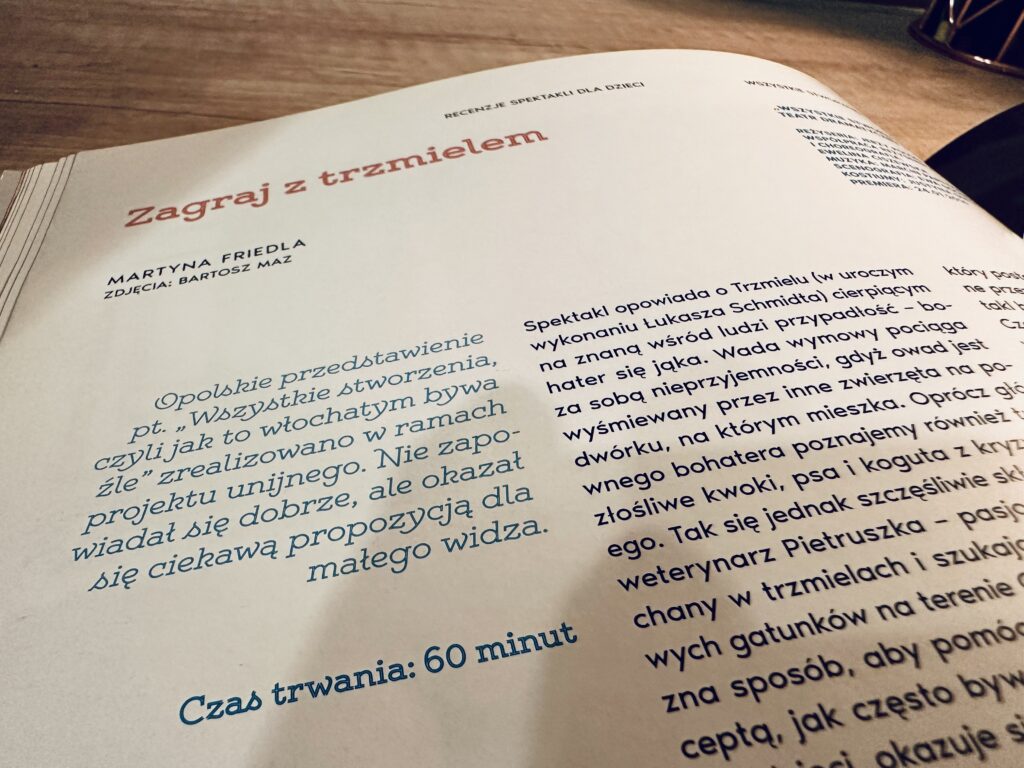
INDEKS - PISMO UNIWERSYTETU OPOLSKIEGO
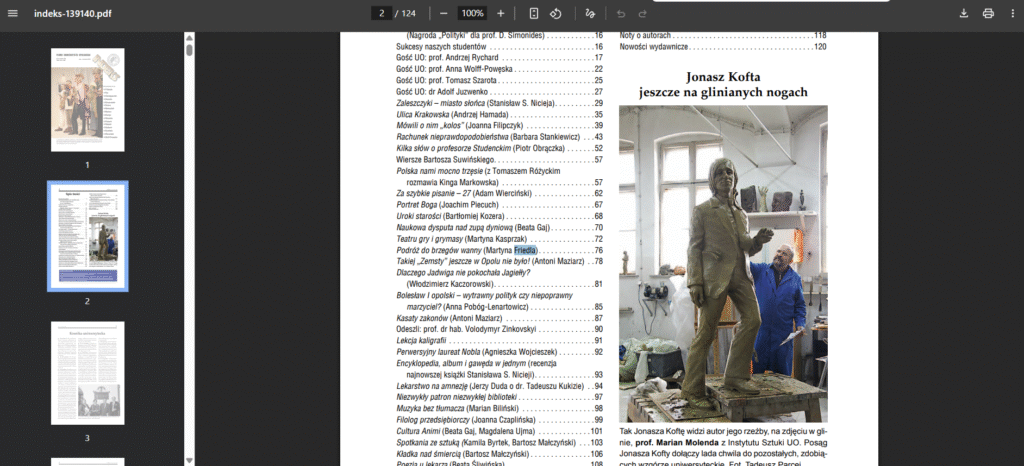
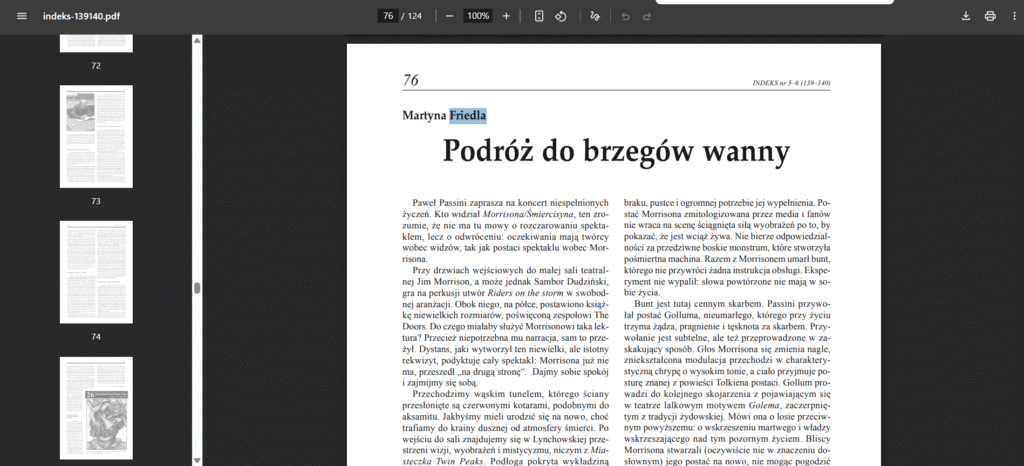
Recenzja spektaklu "Morrison/Śmiercisyn" w reżyserii Pawła Passiniego
EXCERPT:
„Journey to the Edge of the Bathtub
Paweł Passini invites us to a concert of unfulfilled wishes. Anyone who has seen Morrison/Śmiercisyn will understand that this is not about disappointment with the performance, but rather about reversal: here, it is the creators who have expectations of the audience, just as the characters of the play have expectations of Morrison.
At the entrance to the small theatre hall, Jim Morrison—or perhaps Sambor Dudziński—plays a free arrangement of Riders on the Storm on the drums. Next to him, on a shelf, sits a small book dedicated to The Doors. What use would such a reading be to Morrison? He does not need a narrative—he lived it himself. The distance created by this small yet significant prop sets the tone for the entire performance: Morrison is no longer here, he has “crossed to the other side.” Let us leave him be and turn to ourselves.
We pass through a narrow tunnel, its walls draped with red curtains resembling velvet. It feels as though we are to be born anew, though in fact we enter a realm heavy with the atmosphere of death. Upon entering the hall, we find ourselves in a Lynchian space of visions, imaginations, and mysticism, straight out of Twin Peaks. The floor is covered with black-and-white checkered carpeting. A double layer of red tulle, suspended on a metal frame, divides the stage into several smaller areas, multiplying the walls of inaccessibility. Like in a narcotic vision or a dream, our gaze wanders, unable to grasp everything in detail. Only our emotions remain real.
One might suppose that this is a figurative evocation of the origin of the band’s name: The Doors of Perception. Human perception has no access…”

